

B.Sc. in Travel & Tourism Management
Last Updated on August 3, 2023 by Vishnu Nambiar
In this article, we will have an in-depth analysis of B.Sc. in Travel and Tourism Management course. It is a job oriented B.Sc. course (Bachelor of Science). This article covers topics such as – course details, duration, eligibility, colleges, fees, admission, syllabus, careers and salary.
B.Sc. in Travel and Tourism is an undergraduate level Bachelor’s Degree (Science) course. The academic program is 3 years long. Each academic year is divided into two semesters. The entire program is thus made up of six semesters. Here’s B.Sc. in Travel and Tourism Management course overview –
- Name of the course : B.Sc. in Travel and Tourism Management
- Duration : 3 years
- Type of course : Bachelor of Science Degree
- Eligibility : 10+2 passed ( Arts , Commerce or Science ) from a recognized board
What’s B.Sc. in Travel and Tourism all about? What’s the course content like? What’s the scope associated with this course and field? You will find answers to these questions in the next section! In the next section, we will find out more details about travel and tourism management. We’ll find out what this field is all about. Here we go –
B.Sc. in Travel and Tourism Management: Basic Details
Travel and tourism is an exciting sector. It has got immense scope and potential! B.Sc. in Travel and Tourism course caters to the needs of travel and tourism sector. Travel and tourism sector is not just limited to operating tours! Firms involved in this sector have to take care of the following aspects –
- Hospitality management
- Finance and account management
- Customer service management
- HR management
- Material resource management
- Travel and tour operations
A typical travel and tourism firm employs various types of employees. Some of them are – receptionist, customer service agent, technical staff, drivers, helpers etc. In order to manage their day to day operations, staff and material resources, travel and tourism firms need skilled managers. This is where travel and tourism managers come handy! B.Sc. in Travel and Tourism course trains students in the following areas –
- Travel management
- Tourism management
- Marketing management
- Finance management
- Communication skills
Travel and tourism managers are trained in the above mentioned areas. They are well-equipped to fit into travel and tourism industry. Besides that, they may also fit into relevant sectors such as – hospitality, event management and aviation.
B.Sc. in Travel and Tourism Management: Course Details
Type of course.
It is an undergraduate level Bachelor’s Degree (Science) course.
The academic program is 3 years long. Each academic year is divided into two semesters. The entire program is thus made up of six semesters.
Eligibility Criteria
10+2 passed from a recognized board OR passed relevant Diploma program. Note: Eligibility criteria may vary from one institute to another.
B.Sc. in Travel and Tourism Management Colleges
There exists many Government and Private colleges across India offering this course. Government colleges charge relatively lower fees than their private counterparts.
B.Sc. in Travel and Tourism Management Admission
Reputed institutes rely on merit based admission process. Such institutes make use of relevant entrance test to select deserving candidates. Some institutes are also known to conduct their own qualifying test in order to select deserving candidates. Some other institutes are also known to conduct direct as well as donation based admission process.
B.Sc. in Travel and Tourism Management Fees
Fees charged for the academic program may vary from one institute to another. Course fees depends upon the following factors –
- Type of institute (Government, Private, Aided etc)
- Location of the college
- Status and rating of the college
- Scholarship status (of student, if applicable)
Government colleges are known to charge low fees. Average fees in private colleges could be anywhere between 30-70K INR per year.
B.Sc. in Travel and Tourism Management Syllabus
Here are some of the important subjects present in B.Sc. in Travel and Tourism Management curriculum –
- Communication Skills
- Fundamentals of Tourism
- Cultural History and Heritage of India
- Tourism Policy and Law
- Tourism Marketing
- Travel Agency Training
- Tour Guiding Skills and Training
- HR Management
- Computer Utilization and Application
- Office Management and Functions
- Air Ticketing
- Public Relations
- Tour Operation
PG courses and further education
After completing B.Sc. in Travel and Tourism Management course, graduates may take up a job or go for higher studies. Talking about higher studies, they have access to a wide variety of PG courses. Notable PG courses are –
- M.Sc. in Travel and Tourism Management or other relevant M.Sc. program
- MBA in Travel and Tourism Management or other relevant M.Sc. program
- PG Diploma courses
- PG Certificate courses
B.Sc. in Travel and Tourism Management Jobs
Diverse job opportunities are available in front of travel and tourism management professionals. Government as well as private sector enterprises are known to recruit them. Self employment is another popular career path that professionals may go for! When it comes to Government sector, one may find a job at Tourism Boards (State as well as Central), Government Tourist information offices, Government run Hotels, Airlines, Transportation services etc. When it comes to private sector, one may work for Travel agencies, Tour operators, Travel consultants, Airlines, Airports, Travel and ticketing websites, Visa and travel document service firms, Hotels, Resorts, Tourist information office, Cruise lines etc.
Also read: Travel and tourism courses
Aviation courses
Merchant Navy courses
B.Sc. courses after 12th
List of entrance exams after 12th
If one has entrepreneurship skills and access to decent financial resource, one may start own travel agency, ticketing firm, tour agency, travel consultancy, tourist information service etc. Common job profiles available in front of travel and tourism professionals include-
- Travel Agency staff
- Travel and Tourism Consultant
- Travel Agent
- Tour Operator
- Ticketing staff
- Air hostess
- Airline employee / Airport staff
- Entrepreneur
- Customer service manager
- Event manager
- Tour manager
- Tourism promoter / marketer
B.Sc. in Travel and Tourism Management Salary
Starting salary of a travel and tourism manager depends upon a number of factors. Some of the prominent factors are –
- Institute from which the candidate completed the course
- Level of education (UG, PG etc)
- His/her specialization
- The domain he/she has chosen
- Job location
On an average, starting salary could be anywhere between 10-25K INR per month. In case of a Government job, the salary will be as per the pay scale and grade.
I am Vishnu Nambiar a career and educational blogger from India. I am also a full time educational consultant having more than 12 years of experience in the educational sector.
I share articles related to courses, colleges, careers, exam tips and more here.
1 thought on “B.Sc. in Travel & Tourism Management”
Looks to be detail and vital information provided..nice
Leave a Comment Cancel reply
Save my name, email, and website in this browser for the next time I comment.
- Departments
- Fee Payment

- Emblem & Motto
- Mission & Vision
- History and Milestones
- Corporate Social Responsibility
- MCC Higher Secondary School, Chetpet
- MCC Matriculation HSS, Chetpet
- MCC Public School, Chetpet
- MCC Campus Matriculation HSS, East Tambaram
- MCC BOYD – TANDON SCHOOL OF BUSINESS
- MCC Rural Service League School
- School of Continuing Education
- MCC Community College, West Tambaram
- MCC Kotagiri Community College
- MCC Hanshin Hope Centre
- Jonathan Callaghan Memorial Centre and Family Life Institute
- MCC Pulicat Community College
- MCC Association
- Board of Directors
- Governing Body
- Vice – Principals
- Controller of Examinations
- Self-Financed Stream (SFS) Office
- Internal Quality Assurance Cell
- Principal’s Office
- Bursar’s Office
- Office of the Controller of Examinations
- End of Semester Examination (ESE) Regulations
- Internal Continuous Assessment (ICA) Regulations
- Regulations for PhD Programme
- Grading System
- Results – ICA / ESE
- Academic Depository
- Dean of International Programme
- International Programme
- Student Exchange
- Centre for International Social Work
- International Students Information System
- Study Abroad
- Institute for Advanced Christian Studies
- Institute for Administrative Services Coaching
- Dr. Devanesen Centre for Human Resource Development
- Centre for Peace Studies
- Centre for Women’s Studies
- Entrepreneurship Development Cell
- Ideation Club
- Design Studio
- MCC Institution Innovation Council (MCC-IIC)
- Office of the Alumni and Public Relations Officer
- Alumni Association
- Distinguished Alumni
- Register Now
- Prayers For College & Alumni
- Photo Gallery
- Admission 2024-2025
Programmes Offered
- Doctoral Programme
- Students Accommodation
- NRI / International Students
- Financial Aid
- Deanery – Research and Development
- Policy on Research and Development
- Policy on Consultancy
- M.Phil Programme
- PhD Programme
- Post Doctoral Fellowship
- Institutional Ethics Committee
- Office of Research Integrity (ORI)
- Partnership with HEI’s
- Incentives and Awards for Research Activities
- Seed Money Grant (SMG) for Faculty
- Financial Assistance to attend Conferences
- Publications
- Internship Programmes
- Facilities for Research
- MCC Research Colloquium
- Annual Report(R&D) 2022 – 2023
- Graduate Attributes and Programme Outcomes
- Political Science
- Public Administration
- Social Work
- Mathematics
- English Language and Literature
- Business Administration
- Communication
- Tourism Studies
- Microbiology
- Computer Application–BCA
- Computer Science – (B.Sc.)
- Computer Science-MCA
- Visual Communication
- Physical Education, Health Education and Sports
- Data Science
- Choice Based Credit System
- Value Education
- Environmental Studies
- Dean of Students Affairs
- Dean of Women Students
- Psychological Counselling Service
- Placement Cell
- College Union Society
- Attendance Regulations
- Grievance Cell
- Internal Complaints Committee
- Anti-Ragging Committee
- Non-Resident Women Students’ Forum
- National Cadet Corps
- National Service Scheme
- Scrub Society
- Sports and Physical Education
- Student Christian Movement
- Student Services for the Differently Abled
- Foreign Students Information System
- Bishop Heber Chapel
- MCC Infirmary
The Department of Geography, Tourism and Travel Management started its journey in the year 2005. The curriculum includes the papers of both Geography and Tourism in each semester. It covers all the branches of Geography and recent concepts of Geographic Information System (GIS). Innovative papers like logistics in tourism, travel forms and regulations are included in Tourism category, and GIS and Remote Sensing are included in Geography category. UGC Funded B.Voc Hospitality and Tourism Course was introduced in the year 2014.
The Department has a well-stocked library and State-of-the-art computer laboratory. Technical papers are taught in all the three fields every semester. Department offers verbal foreign language training to students (French, German and Korean) to improve their skills. Educational trips and field visits are mandatory for the students.
B.Sc Geography

Nameetha Vasanthkumar

P. Subashini

P. Niranjini

Yasodharan Suresh
Highlights of the programme
- Understand the basic concepts of Geography and Tourism and their role in society.
- Prepare Tour itinerary and costing of the Tour
- Understand the behaviour of the customer
- Understand the role of technology in Geography and Tourism
- Develop the skill of designing a Map
- Analyze the importance of Tourism Spots in the world
- Understand the types and role of travel agent and tour operator with their services
- Develop the skills of a diagrammatic representation of data
- Enhance communication and presentation skills
- Understand the concepts of IATA Geography and Global Indicators for Air Ticketing
- Develop the skill of preparing Airway Bill
- Understand the positive and negative impact of tourism on the destination
Welcome to Madras Christian College

Top Left Menu
- Make a payment
Top Right Menu
- In italiano

- Mission & Priorities
- Rome is our classroom
- An AUR video gallery
- Virtual Campus Tour
- Our Location
- Map and Directions
- The AUR Shop - Branded Items
- AUR Fast Facts
- Reviews from alumni and families
Latest News
- Upcoming Events
- Event Archive
- AUR #Unplugged
- AUR's President
- Board of Trustees
- AUR Staff Directory
- Honorary Degree recipients
- AUR's Accreditation & recognition in the United States & Italy
- Assessment at AUR
- Student Consumer Information
- Employment opportunities
- AUR Memberships & Partnerships
- Archaeology & Classics
- Art History
- Business Administration
- Communication & Digital Media
- English Writing, Literature and Publishing
- Interdisciplinary Studies
- International Relations and Global Politics
- Travel and Tourism Management
- Associate of Applied Arts in International Business
- Associate of Arts in Liberal Studies
- Undergraduate Minors
- Undergraduate Prospectus
- Guida ai programmi per gli studenti universitari
- The Graduate School at AUR
- Cultural Heritage (MA)
- Food Studies (MA)
- Peace Studies & Conflict Resolution (MA)
- Pre-Law at AUR
- General Education at AUR
- The First-Year program
- AUR Abroad - The AURA Program
- The Center for Food Studies
- Transfer Pathway to American University, Washington
- AUR offers a Direct Transfer agreement with Verto Education
- Study Abroad In Rome, Italy
- AUR's Study Abroad Partnerships
- Academic Calendar
- Full Catalogs & Course Offering
- The Dean's Office
- The Registrar's Office
- AUR Library
- Academic Help Desks
- IT Services & Facilities
- Comparability & Verification of your degree in Italy
- The Admissions Process
- Book a one-to-one meeting with our admission counselors
- Upcoming Admissions Events
- Book a Campus Tour
- Be a Student for a Day
- Chat with our students online
- Undergraduate Admissions Information
- Undergraduate Admissions Deadlines
- Transfer Student Admissions & Credit Transfer
- Free transfer credit evaluation
- Study Abroad/Visiting Student Requirements
- Undergraduate Visa & Residency requirements
- Graduate Program Admission Requirements
- Graduate Program Visa & Residency Requirements
- Graduate Admissions Deadlines
- Tuition and Fees: US Dollars
- Tuition and Fees: Euros
- Tuition and Fees for Study Abroad and Visiting Students
- Tuition & Fees F.A.Q.
- Tuition and Fees Payments and Policies
- Make a Payment
- Graduate Program Tuition & Fees - US Dollars
- Graduate Program Tuition & Fees - Euros
- Graduate Program, estimated cost of attendance
- Graduate Tuition & Fees Payments & Policies
- Graduate Make a Payment
- AUR Scholarships
- Astudy International Education scholarships
- Student Loans F.A.Q.
- Student Training Program
- US Federal Student Loans
- Veterans Aid
- Schedule a one-to-one meeting with our Financial Aid team
- Real Projects: Professional Experience for Students
- Internships Opportunities
- Internship Experiences
- Where can a degree from AUR take you?
- Alumni Career Success
- The Student Life Team
- Res Grads Program
- Chat with one of our current students
- Social Activities
- Field Trips
- Student Handbook
- Discrimination and Harassment
- Chat with our students
- Student Housing
- Living in the Eternal City
- Tips to Survive and Thrive in Rome
- Safety & Security
- Health Insurance
- What to Bring With You
- New Student Orientation
- Men's and Women's Futsal (soccer)
- Co-Ed Volleyball
- Running Club
- Yoga & Mat Pilates
- Fitness Center
- Student Clubs & Activities
- Bachelor Degree in Travel and Tourism Management
- Undergraduate Programs
AUR’s Bachelor of Science in Travel and Tourism Management prepares graduates for a range of fulfilling careers within one of the world’s largest and most diverse industries. Today, the tourism industry accounts for one in 11 jobs globally. Over the next ten years, the industry will grow at a rate of more than 4% per year. There are real opportunities within this sector for rewarding and exhilarating careers.
Why study travel and tourism management at aur.
There are few more appropriate and relevant places to earn a degree in tourism than in Rome, one of the world’s most important tourist destinations. Rome is often described as the world’s largest outdoor museum, and while this is certainly accurate, the city is anything but an artificial theme park. It is a vibrant, modern European capital that has retained its political and economic relevance in Europe for more than two thousand years.
Career choices
The travel and tourism sector offers myriad career opportunities for those with business management skills. This expanding industry encompasses the marketing and service management of all forms of accommodation services, transportation for both leisure and business, cultural activities, and more. New enterprises and innovations in the industry are constantly springing up, and so too are new career opportunities.
Field Studies
We prepare students for flexible career paths through a combination of theoretical and practical knowledge. These are learned through classroom instruction, field trips, seminars with travel and tourism experts, and hands-on experience. Travel and Tourism Management majors will have the opportunity to gain real-world experience through internships in local tourism-related environments such as hotels, festivals, museums, media companies, and travel agencies.

Field Study Trips for credit
The Travel and Tourism Management Program offers a range of experiential academic trips and site visits both within Italy and throughout Europe. These opportunities to enhance the theoretical knowledge of the classroom with practical, hands-on experience are an invaluable element of studying at AUR. Recent examples include:
- Tasting Castelli Romani: Place branding through food and wine.
- Exploring Italy’s natural wonders in South Tyrol: The Dolomites UNESCO World Heritage Site.
- Fashion Outlet Tourism: Rome’s world of affordable luxury.
- Olive Oil production & tourism opportunities in Umbria
- Terme dei Papi spa in Viterbo: Studying a joint public & private tourism promotion project.

Travel & Tourism internship opportunities
AUR’s Travel and Tourism Management curriculum is specifically designed to let students acquire the planning and management skills related to the growth and development of tourism throughout the world. The ‘real-world experience’ elements of the program are further enhanced by a robust internship program. Recent internship opportunities have included:
- Walt Disney World (EPCOT-Italian Pavilion)
- Vatican Museums
- Rome Chamber Music Festival
- Agriturismo Diacceroni (Tuscany)
- Context Travel (Rome based travel agency)
- Hotel Project (Rome based Hotel consulting company)
Unique concentrations within Travel and Tourism Management: Food Tourism and Cultural Heritage Tourism
Travel and Tourism Management students can choose to specialize their studies in Food Tourism or Cultural & Heritage Tourism.

Cultural and Heritage Tourism Cultural and Heritage Tourism is a leading sector in Italy, fueled by its immense wealth of artistic, archaeological and architectural treasure, thanks to which it is ranked first in the world for the number of UNESCO World Heritage sites it contains. Students interested in specializing in this area of the travel and tourism industry may concentrate their degree studies in Cultural and Heritage Tourism.
Food Tourism Italy is (rightly) renowned around the world for its cuisine. An increased tourist interest in local food traditions and the farm-to-table movement have driven an explosion in the food tourism business. Italy is the world’s top producer of wine, a leading producer of fine olive oil, parmesan, and prosciutto, to name just a few products that make it such a heavyweight in the global food market. Students interested in working for organizations involved in the production or promotion of Italy’s unique food traditions can take a concentration in Food Tourism.
Career destinations
AUR's Travel & Tourism Management program provides students with both industry-specialized skills and knowledge and overarching management & business training. This means that graduates of the program are career-ready to enter the travel & tourism job market but they also have transferable skills which are highly desirable across a range of career options including Luxury Travel management, Heritage Site management, Convention and Visitors Bureau management, Marketing management, Communications management, Event management, and much more.

Asha M. - 2019
Graduate Studies in the U.K.

Jill S. - 2018
Executive Travel Management

Billy F. 2020
Marketing & Advertising manager

Millie D. - 2020
Graduate Studies in New York

Phil A. - 2019
Logistic management in Italy

Andy T. - 2019
Travel Blogger, worldwide
Selected Core Course
Selected major electives.
- Principles of Marketing
- Financial Accounting
- International Business Law
- Computer Applications for Business
- Introduction to Travel and Tourism
- Principles of Macroeconomics
- Introduction to International Business
Research Methods in Travel and Tourism
- Human Resource Management in Service Operations
- Entrepreneurship: Creating, Financing and Managing New Ventures
- Travel and Tourism Strategy
- Management of Cultural Heritage
- Travel Writing
- Advertising Strategy
- Tourism and Hospitality Law
- Food Tourism
- Destination Marketing: European Wonders
- Sustainable Heritage Tourism
- Food and (Multi)culture in Italy
- The Grand Tour and the Literature of Tourism
- Italian Culture at the Movies
- Global Value Chain Analysis
Selected Travel & Tourism Management course details
In this course, students explore the processes for obtaining and analyzing relevant, reliable, valid and timely information necessary to examine travel and tourism industry practices and trends.

TRAVEL AND TOURISM STRATEGY
Students will analyze strategic choices and what those choices mean within the context of a travel and tourism business. Special emphasis is placed on the importance and application of an analysis of risk and its management within the context of a travel and tourism business.
DESTINATION MARKETING: EUROPEAN WONDERS
This field trip course provides a hands-on opportunity to critically explore destination branding in Europe, and to consider the range of marketing strategies employed by regional governments, Destination Marketing Organizations (DMOs), local businesses and communities.

FOOD TOURISM
This class on food tourism will focus on learning the geography of food for various regions of the world through the study of the qualities and attributes of various cuisines and the role that culinary tourism plays in their economy.
CULTURAL AND HERITAGE TOURISM
Emphasis is placed on developing theoretical and practical insights into heritage related to place, community, ethnicity and identity, as well as the stakeholders in the local and global tourism industry.

Marketing for Travel and Tourism
We will explore the areas and the challenges facing industry actors as they strive to create distinctive experiences for increasingly demanding and jaded consumers.
Outstanding Faculty
Aur's travel & tourism management faculty is comprised of the outstanding and experienced academics & industry professionals with a broad range of theoretical & practical expertise in their disciplines..
See all faculty profiles

Anna Sasso is a marketing specialist, lecturer, and consultant. She combines her business education and managerial experience with a passion for human potential to help students and professionals uncover their unique value and expand their careers. Her professional motto is: ‘To create sustainable competitive advantage through a quality education and lifelong learning.'

Marshall Langer
Marshall entered academia after a 12-year career in finance in the U.S. and Europe, in investment banking and risk arbitrage with firms such as Donaldson, Lufkin & Jenrette Securities Corp and BNP Paribas. Marshall is also a Trained Group Counselor. Marshall Langer has been an Adjunct Professor at AUR since 2004.

Laura Prota
An economics specialist, Professor Prota publishes regularly on issues related to the specificity of Southeast Asian market transition with a particular focus on place and path-dependent trajectories of development. Beyond her academic interests, Prota has worked as a consultant and project coordinator in several rural development projects in Southeast Asia.
Course requirements and further detail
For more in-depth information about this program and individual course requirements, please see our full catalog .
Why study Travel & Tourism Management at AUR Field study trips for credit Travel & Tourism Management Internships Unique Concentrations: Food Tourism & Heritage Tourism Career Destinations Travel & Tourism Management course information Outstanding Faculty
Academic Field Trips & Experiential Learning
Why is Rome the best place to study Travel & Tourism Management? Meet the Travel & Tourism Management faculty Download our full catalog Talk to an Admissions Counselor Take a virtual tour of our campus See what our alumni think of AUR See available Scholarships
See AUR's main Instagram Connect with us on Facebook Visit our YouTube Channel

Bachelor Degree in Business Administration
Bachelor Degree in International Relations and Global Politics
- We’re on your favourite socials!
BSc in Travel & Tourism Management
- BSc Travel Tourism Colleges
- About B.Sc in Travel & Tourism Management
B.Sc in Travel & Tourism Management is a three-year program divided into six semesters. Tourism management is the study of the latest trends and technology in the tourism industry and there are many programs available for tourism management education. B.Sc in Travel & Tourism Management trains students in leadership skills and knowledge and skills required for a successful career in tourism management. The program will cover topics from the management of tourism and travel activities. Besides this, the program will also cover topics from financial management, marketing management, HR management and customer service management.
B.Sc in Travel & Tourism Management is ideally suited for the candidates who are interested in managing travel and tourism activities. There are many B.Sc in Travel & Tourism Management offering colleges in India. Candidates may enrol at any college offering B.Sc in Travel & Tourism Management after checking the fees and courses offered.
B.Sc in Travel & Tourism Management Highlights
Check the major highlights of the BSc in Travel & Tourism Management program
Table of Contents
B.sc in travel & tourism management eligibility criteria, b.sc in travel & tourism management syllabus, b.sc in travel & tourism management career options and job prospects, faqs about bsc travel tourism.
Candidates seeking admission to B.Sc in Travel & Tourism Management can go through the eligibility criteria provided below.
They must have completed 12th from any recognised institution or university.
Minimum percentage required for admission is 55%. Some colleges might have a different percentage limit for the general category and reserved category.
B.Sc in Travel & Tourism Management Selection Process
Candidates seeking admission to the three years B.Sc in Travel & Tourism Management program will be selected on the basis of their academic scores. Colleges will prepare a merit list on the basis of the candidates’ scores in the qualifying examination. Shortlisted candidates will then have to visit the college to confirm their admission. They will also have to submit a copy of the 12th/ 10th mark sheet along with passport-sized photographs.
Top B.Sc in Travel & Tourism Management Colleges in India
Chandigarh University, Chandigarh and Madras Christian College, Chennai are two well-known B.Sc in Travel & Tourism Management colleges in India. Candidates interested in admission to any of these colleges can fill the Common Application Form. They can visit the official website of these colleges to know their fee structure and placements.
Check the table below to know about the syllabus of B.Sc in Travel & Tourism Management.
There are many job opportunities available in the travel and tourism industry. Candidates can work with any Airline, Transportation Service, Hotels after completing B.Sc in Travel & Tourism Management. They can also apply to any travel agency or travel consultancy. Apart from this, they can also start their own business or start their own venture after completing B.Sc in Travel & Tourism Management.
Some of the profiles where the candidates can apply for a job are listed below.
Travel Agency staff
Travel Agent
Travel and Tourism Consultant
Tour Operator
Air hostess
Ticketing staff
Airline employee / Airport staff
Tourist Guide
Entrepreneur
Customer service manager
Tour manager
Event manager
Tourism promoter/ marketer
They can apply to any sector provided below.
Transportation Services
Travel Agencies
Travel & Ticketing Websites
Colleges & Institutions
Visa & Travel Document Service Firms
Travel Consultancy
Tour Operator Offices
Who are the top recruiters for B.Sc in Travel & Tourism Management?
What is the admission process of b.sc in travel & tourism management, is the syllabus of b.sc in travel & tourism management same for all colleges, what documents are required for admission in b.sc in travel & tourism management, where can i apply for a job after b.sc in travel & tourism management, what is the minimum aggregate required for admission to b.sc in travel & tourism management, what is the duration of b.sc in travel & tourism management, what is the eligibility criteria for b.sc in travel & tourism management, what other programs are available in travel & tourism management, what is the average fee for b.sc in travel & tourism management, related questions.
Subhashri Roy , Student / Alumni
Dear student
You need not apply for the MAKAUT CET counselling process separately. You may participate in the Online Admission Counselling for College/Course Choice Filling through the Applicant Login option available on the official website for MAKAUT WB CET. The choice filling window will be available for a short period of time, within which you will be required to submit your course preferences. Subsequently, the university will issue the allotment card to qualified students based on a range of factors.
You are required to download the MAKAUT CET rank card before the document verification stage of the counselling process. Qualified students will be called for the document verification round at the designated venues. After the documents have been verified seats will be allotted to the candidates on the basis of rank obtained in the MAKAUT CET exam.
Dear student,
There are nearly 300 seats available in MAKAUT in different courses like Bachelor of Science and Bachelor of Technology for different specializations. Courses like BTech in Computer Science & Engineering, BTech in Information Technology, B.Sc. in Animation, B.Sc. in Economics, B.Sc. in Media Science, B.Sc. in Statistics, and B.Sc. in Mathematics and Computer Applications are some of the courses offered by MAKAUT that you can apply for through CET conducted by MAKAUT WB.
The seat intake for each of these courses is different and you may check the official website of MAKAUT to find out the number of seats available for each course offered through CET by Maulana Abul Kalam Azad University of Technology .
Abhik Das , Student / Alumni
Dear student, the latest detailed B.Sc computer science placement report of Government DB Girls’ PG College Raipur is not available on its official website. We have, however, compiled the contact information of the Career, Counselling and Placement Cell officials from the official website. You can get in touch with them and find out about the placement opportunities that the institute offers to the B.Sc computer science graduates -
Related News

July 24, 2024 | By: Rohan Tyagi

June 06, 2024 | By: Rohan Tyagi
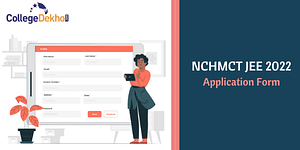
June 03, 2024 | By: Yash Dhamija

May 22, 2024 | By: Mahima Gupta

May 22, 2024 | By: Rini Maria

May 21, 2024 | By: Supreeta Roy

May 11, 2024 | By: Supreeta Roy

Related Articles

Aug 07, 2024 | By: Yash Dhamija

Aug 07, 2024 | By: Shruti Chatterjee

Aug 07, 2024 | By: Mrunmayai Bobade

Aug 07, 2024 | By: surbhi sharma

Aug 07, 2024 | By: Aarushi Jain

Aug 06, 2024 | By: Aarushi Jain

Aug 06, 2024 | By: Kamayani Meghawal

Aug 06, 2024 | By: Samiksha Rautela
Popular Courses
- B.Sc in Travel & Tourism Management
- Common Application form
- Job Ready Courses
- ETP Admissions
- Scholarships
- Visual Stories (English)
- Visual Stories (Hindi)
- Career Compass
- Write a review
- DU Predictor
- Unit Calculator
Pride Hulkul, 6th floor, No 116, Lalbagh Road, Bengaluru, Karnataka - 560027
Godrej Genesis, 15th floor, 1509, Salt lake Sector 5, Kolkata, West Bengal - 700091
6th & 7th Floor, 29, Moji Colony, Calgiri Marg, Malviya Nagar, Jaipur, Rajasthan - 302017
6th Floor, CollegeDekho Office, Capital Cityscape, Sector 66, Gurugram Haryana 122002
- 1800-572-9877
- [email protected]
Trending Links
- Essay on Independence Day in Hindi
- JEE Main College Predictor 2024
- NEET College Predictor 2024
- Top Medical Colleges in India
- Independence Day Speech in Hindi
- Visual Stories
- JEE Mains 2024 Mark Vs Percentile
- NEET 2024 CutOff
- Engineering Colleges in India
- MBA Courses
- Medical Courses
Most Viewed Links
- Master of Arts
- Aeronautical Engineering
- BFIT Dehradun
- Chandigarh University
- Hindi Articles
- NEET Counselling 2024
- Merchant Navy
- Manipal University or Amity University
- List of B.Sc Courses
- SRM University vs VIT Vellore
- JEE Main 2024
- B.ED Course
- Neet vs JEE Main
Courses in india
- B. Tech : B Tech Mechanical Engineering Software Engineering Aeronautical Engineering Electronics and Communication Engineering Chemical Engineering Biomedical Engineering Automobile Engineering B Tech IT Computer Science Engineering
- M. Tech : M Tech M Tech in Data Science M Tech in Computer Science M Tech in Civil Engineering M Tech in Mining Engineering M Tech in Electrical Engineering M Tech in Food Technology M Tech in Chemical Engineering M Tech Geoinformatics M Tech ECE
- MBA : MBA BBA MBA Project management MBA in finance PGDM Executive MBA BBM MBA in Business Analytics MBA in HR MBA in Marketing
- BBA. : BBA BBA Aviation BBA in Finance BBA International Business BBA in Airport Management BBA Logistics BBA in Digital Marketing BBA in Marketing BBA MBA Integrated Course BBA in HR
- LAW : LLB BA LLB BBA LLB BSc LLB LLM course Criminal Law Labour Law Corporate Law Business Law Company Law
- Science : BSc MSc BSc Computer Science Actuarial Science BSc Biotechnology BSc Microbiology BSc IT BSc Forensic Science BSc Chemistry BSc Physics
- Commerce : BCom MCom Banking Course CA Course CFA BAF ACCA Course MFC BFM BBI Company Secretary
- Medical : MBBS MDS BUMS BDS BHMS Doctor of Medicine Doctorate of Medicine BPT Course MPH BAMS
- Para Medical : BPMT Medical Transcription BMLT MPT Biomechanics BVSC BSMS Anesthesia Course Master of Surgery DHMS Master of Physiotherapy
- Hotel Management : MHA BTTM Hospitality Management BHM MBA in Hotel Management Travel and Tourism Management BHMCT BSc in Hospitality and Hotel Administration Masters in Hotel Management BBA in Hotel Management
- BA : BA Archaeology Company Secretary home science BFA BA Psychology BA English BA english BA Economics
- MA : Master of Arts MPhil MA Hindi MFA MA English MA Psychology MA Economics MA Political Science MA History MA Public Administration
- Media And Mass Communication : Photography Course Journalism Course BMM Fashion Photography BJMS Radio Jockey BSc Visual Communication Masters in Journalism and Mass Communication BA Mass Communication Masters in Mass Communication
- Agriculture : Agricultue BSc Agriculture BSc horticulture MSc agriculture BSc Hons Agri Business Management Diploma in Horticulture BSc Sericulture
- Pharmacy : B Pharma D Pharma Pharm D Course M Pharmacy M Pharm M Pharma Pharmaceutical Analysis M Pharm in Biotechnology B Pharm Hons Pharma D
- Nursing : BSc Nursing GNM Nursing ANM Nursing Post Basic BSc Nursing Nursing Assistant Course OT nursing Course M Phil Nursing MSc Pediatric Nursing MSc in Medical Surgical Nursing Maternity Nursing Course
- Information Technology : MCA Data Science BCA MSc Data Science Ethical Hacking Course MSc IT MBA IT BSc MSc Data Science Computer Hardware Course BBA in Computer Application
- Design : Graphic Designing Interior Designing Animation Jewellery Designing Web Designing Fashion Designing Course Furniture Design Textile Designing Fashion Styling BDes
- Education : B Ed B P ED Diploma in Elementary Education M Ed B EL ED BSc B Ed BA B Ed BEd Special Education MA Education BED in Commerce
Popular Universities
- DOON University
- MNIT Jaipur
- NIT Jalandhar
- NIT Jamshedpur
- NIT Silchar
- TECHNO India University
- TEZPUR University
- University of Hyderabad
- University of Mysore
- VIDYASAGAR University
- ANNA University
- JAYPEE University
- Terms & Conditions
- Privacy Policy

45,000+ students realised their study abroad dream with us. Take the first step today
Here’s your new year gift, one app for all your, study abroad needs, start your journey, track your progress, grow with the community and so much more.

Verification Code
An OTP has been sent to your registered mobile no. Please verify

Thanks for your comment !
Our team will review it before it's shown to our readers.

- Travel and Tourism /
What is Travel and Tourism Management?

- Updated on
- Feb 7, 2023
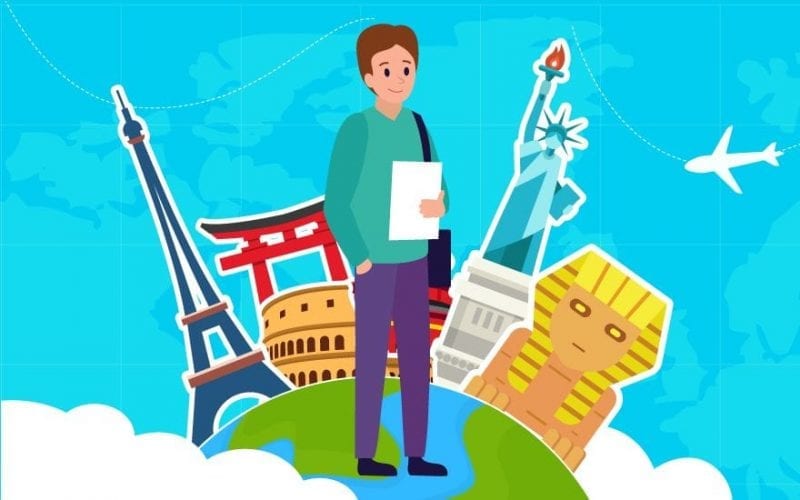
Do you feel impressed by the prospect of working in an industry that may involve a lot of travel? Would be enthusiastic to explore the world while you get to experience newer aspects of life? If travel is your passion and management is what you are good at, then, a career in Travel and Tourism Management might be perfect for you! Being a rapidly expanding and highly dynamic industry, travel and tourism achieved significant heights in the past few years. With immense career opportunities underway, you can explore a lot of interesting career opportunities in this field. Hence, through this blog, we would help you in exploring how to make a career in travel and tourism .
This Blog Includes:
Overview of travel and tourism management , popular travel and tourism management courses, travel and tourism management entrance exams, top global universities , top indian institutes for tourism management , what jobs can i get with travel and tourism management degree , job prospects & salary, top recruiters in india, tourism industry in india, types of travel & tourism in india.
Since the Travel and Tourism industry is an arena wherein most of the jobs that one undertakes are certainly client-facing and involve a certain extent of interaction, courses in this sphere involve various studies in the domain of Communication and Writing skills, Critical Reasoning, and Presentation. Building on these fundamentals, the courses undertake certain papers on the Fundamentals of Tourism, its History, Ecotourism, Environmental Management , Business Statistics, Aviation Management , Airport Management , Introduction to Hospitality , Business Research Methods, Human Resource Management, Travel Agency and Tourism Management, Innovative Practises in Tourism and Event Management. So, for those who look forward to broadening their understanding regarding international tourism, this course would be highly rewarding for you.
To progress in the field of Travel and Tourism, there are certain pathways that might seem fit for your future ventures. You can directly get yourselves enrolled in a Travel and Tourism course after the 12th that would give you the key information necessary at the bachelor’s level. But if you have the zeal to learn the managerial skills required for the tourism sector along with in-depth learning about the functioning of international tourism, consider going for master’s or doctoral-level courses.
Some of the popular courses in Travel and Tourism Management have been listed below:
Below mentioned are the entrance exams students need to prepare for pursuing Travel and Tourism Management:
UG Entrance Exams
- IIHM eCHAT
- JMI Entrance Exam
- CUCET Chandigarh University
PG Entrance Exams
- Karnataka PGCET
To know more about the education and preparation needed to work in Travel and Tourism, read our comprehensive blog on Travel and Tourism courses .
Not only does the travel and tourism industry involve a thorough study of the subject matter under consideration but also requires one to perfect their skills relating such as leadership, problem-solving, customer-focused approach, ability to work deadlines and team working. So, when you get yourself enrolled in a course in travel and tourism management in one of the top universities around the world, you can nurture your skills in the best possible way.
- New York University
- University of Illinois
- King’s College London
- The Chinese University of Hong Kong
- Boston University
- Wageningen University and Research Centre
- Michigan State University
- University of Gloucestershire
- The University of Queensland
- Erasmus University Rotterdam
- University of Groningen
- Monash University
- Pennsylvania State University
- Michigan State University
Following are the top-level colleges for pursuing a course in Travel & Tourism Management:
- Indian Institute of Tourism & Travel Management – Gwalior
- Indian Institute of Hospitality & Management – Thane
- Christ University – Bangalore
- National Institute of Tourism & Hospitality Management – Hyderabad
- Amity Institute of Travel & Tourism – Noida
- Kerala Institute of Tourism & Travel Studies
- Indian Institute of Tourism & Travel Management – Bhubaneswar
- Indian Institute of Tourism & Travel Management – Noida
- Indian Institute of Tourism & Travel Management – Goa
- Indian Institute of Tourism & Travel Management – Nellore
Travel and Tourism Management students are taught business concepts specific to the travel industry and they can take up courses in Human Resources, Media Relations, Facilities Management and Financial Strategies. Besides, this overseas education provides internship opportunities for international students prior to graduation. From working in multidimensional roles in the hotel industry and providing premium services to customers to employing your art of storytelling to provide tour guides to people, there are numerous jobs in Travel and Tourism . Joining at the executive level, you can extend your career and make your way into great portfolios in top-notch institutions.
Some of the prospective job avenues that you may consider after completing courses in Travel and Tourism Management include:
- Travel Agent : Your role as a Travel Agent allows you to plan a trip including flights, car rentals and accommodations. Also, you should have knowledge about the weather, traditions and tourist attractions of popular destinations. An assistant must have good networking and customer service skills to build and maintain a clientele base.
- Travel Manager: A Travel Coordinator or Manager organises the travel arrangement of large organisations such as non-profits or universities. From booking flights on commercial or private jets, reserving conference rooms, and supervising support staff in forwarding information, the role of a Travel Manager is endless.
- Lodging Manager: Lodging Managers are responsible for operating resorts, hotels and motels and are in charge of overseeing the complete operation. Larger landmarks may have separate managers for food services, housekeeping and human resources while small motels may only have one General Manager.
Besides these, other profiles that you can consider in Travel and Tourism Management include Tour Manager, Event Manager, Holiday Representative, Tourism Officer, Air Cabin Crew , Property Manager, etc.
Tourism Management offers plenty of opportunities to graduates & undergraduates. Here is a list of top job profiles for reference:
- Holiday/Travel Agent
- Travel Executive
- Tourism Manager
- Tourist Guide
- Tour Manager
- Hotel Manager
- Spa Manager
- Travel Agency Manager
- PR Manager
- Event Manager
The main concern of every candidate is to have a good amount of salary. In the case of tourism, the starting salary is low like in other professions. For early experience, one can also do part-time jobs or can consider summer internships. The Initial Salary ranges from INR 15,000 – 20,000. Although the salary increases with increased experience.
Here is a list of a few companies which offers jobs in Tourism:
- Cox & Kings Ltd.
- Indian Railways Catering & Tourism Corporation (IRCTC)
- Thomas Cook (India) Ltd.
- Make My Trip
- Club Mahindra Holidays
- East India Travel Co.
- Jet Airways
- Kesari Tours
- Indian Airlines & British Airways, etc.
A traveller knows how vital, dynamic and evolving is the industry of Tourism. It is important for the economic growth of any country. According to the reports of Tourism in India, it has generated INR 15.24 lakh crore or 9.4% of India’s GDP in 2017. It has also provided employment to the candidates in absolute terms with around 41.622 million jobs that are 8% of the total employment in India. It is estimated that the tourism industry will grow at an annual rate of 6.9% and reach INR 32.50 lakhs crore by 2028. So it is a profound idea of pursuing the course of Travel & Tourism.
Tourism is all about leisure time and travelling is an activity of people to distant places away from home. It includes Outbound Tourism, Inbound Tourism, and Domestic Tourism.
Outbound Tourism: It refers to travelling to a place outside of your home country. For example, from the Indian tourism perspective, Going to the UK from India.
Inbound Tourism: It is when people from another country visit your country. For example, from the Indian tourism perspective, Coming to India from Canada.
Domestic Tourism: As the name suggests, refers to the people travelling from place to place within the home country. For example, from the Indian tourism perspective, Going from Delhi to Mumbai.
Ans. Candidates need to have – excellent communication skills, enthusiasm, patience, time management skills, teamwork, leadership skills, etc.
Ans Indian Institute of Tourism & Travel Management – Gwalior Indian Institute of Hospitality & Management – Thane Christ University – Bangalore National Institute of Tourism & Hospitality Management – Hyderabad
Ans. IRCTC Air Asia Flying Fox Indian Airlines & British Airways Make My Trip Emirates
Ans. The scope of Tourism would not end as many people love to explore & visit places. Keeps the lives of people active & away from stress. The opportunities will never end for freshers in this field.
Ans. As an event manager, tour manager, tour guide, PR manager, Travel agency manager, etc.
Navigating tourists through travel destinations and offering them the history of art and architecture, a job or a business in Travel and Tourism Management would help you find your way into the world. And if you have any doubts or inhibitions, then our experts at Leverage Edu can figure things out for you.
Team Leverage Edu
Leave a Reply Cancel reply
Save my name, email, and website in this browser for the next time I comment.
Contact no. *
Hi Priyanshu!
You can sign up for our newsletter to get regular updates on our blogs!
Please give me information about travel and tourism course.
Hi Roshan. Travel and tourism courses are courses that gives an individual knowledge about the international tourism industry. Some of the popular Bachelor’s courses include : BA in Travel & Tourism Management, BA in Tourism Studies, BA in Hospitality, Travel & Tourism Management, and BBA in Travel & Tourism Management. The top universities you can apply for these courses are: New York University, University of Illinois, King’s College London, The Chinese University of Hong Kong, and the Boston University. To discover more articles like this one visit the experts at Leverage Edu.

Leaving already?
8 Universities with higher ROI than IITs and IIMs
Grab this one-time opportunity to download this ebook
Connect With Us
45,000+ students realised their study abroad dream with us. take the first step today..

Resend OTP in

Need help with?
Study abroad.
UK, Canada, US & More
IELTS, GRE, GMAT & More
Scholarship, Loans & Forex
Country Preference
New Zealand
Which English test are you planning to take?
Which academic test are you planning to take.
Not Sure yet
When are you planning to take the exam?
Already booked my exam slot
Within 2 Months
Want to learn about the test
Which Degree do you wish to pursue?
When do you want to start studying abroad.
September 2024
January 2025
What is your budget to study abroad?

How would you describe this article ?
Please rate this article
We would like to hear more.
Bachelor of Science (BSc Geography Travel and Tourism)

Learning Mode:
Course level:, course duration:, eligiblity:, course details:.
B.Sc Geography, Travel and Tourism- World Geography of Travel and Tourism addresses the need to understand the cultural, environmental, historical and political context in which international tourism takes place. The expert author team has included major themes and issues in tourism, and positioned them in a regional context. In this way, this text takes a major step into a more analytical approach to global tourism while still providing a clear account of the geography of travel and tourism.
Browse Colleges offering Bachelor of Science (BSc Geography Travel and Tourism) course
Related courses.
- Undergraduate Diploma in Travel & Tourism Management
- Post Graduate Diploma in Travel & Tourism Management
- Bachelor in Travel & Tourism Management (BTTM)
- IATA Consultant Course
- Advance Diploma in Aviation & Tourism Management
- Diploma in Tourism & Travel Management Programme (TTMP)
- Basic Course in Wine Tourism
- Diploma in IATA/UFTAA Foundation
- Airlines and Travel Management (IATA / UFTAA BASED)
- Diploma in Travel & Tourism
- Master of Business Administration (MBA Travel & Tourism)
- Master of Travel and Tourism
- Certification Travel & Tourism (CTT)
- Master of Science (MSc Tourism)
- Bachelor of Business Administration (BBA Tourism and Travel Management)
Stay connected with us on
Today: Aug 22, 2024
- Top Colleges
- Top Courses
- Entrance Exams
- Admission 2024
- Study Abroad
- Study in Canada
- Study in UK
- Study in USA
- Study in Australia
- Study in Germany
- IELTS Material
- Scholarships
- Sarkari Exam
- Visual Stories
- College Compare
- Write a review
- Login/ Register
- Login / Register
B.Sc Geography Jobs, Scope, Salary in India

B.Sc Geography jobs exist in both the government and private sectors for fresh graduates. The job opportunities are very diverse and flexible, making it possible for graduates to be successful. The graduates' education during their undergraduate degree helps them succeed in whichever field they choose to pursue.
Career Prospects and Job Scope for a B.Sc Geography Graduate
B.Sc Geography jobs in India are available for fresh graduates in various fields and industries. Geographers also can join NGOs and other developmental agencies engaged in population studies, rural development, and environmental issues. Teaching in schools or colleges, or universities is also a good option for geographers. Below are some of the popular job titles for Bsc Geography graduates:
- Urban Planner or Community Development
- Cartographer
- GIS Specialist
- Climatologist
- Environmental Management
- Writer or Researcher
Areas of Recruitment for B.Sc Geography Graduates
Many private and government organizations hire graduates of a B.Sc Geography course. The education that students gain during their course makes them very lucrative employees. They can work in many industries after completing their course; some of the popular employers are:
- Geological Survey of India (GSI)
- Institute of Himalayan Geology
- Physical Research Laboratory (PRL)
- Reliance Industries Limited (RIL)
Salary Packages for B.Sc Geography
B.Sc Geography salary in India, according to Glassdoor, is approximately INR 3 LPA. The B.Sc Geography scope in India is very diverse, and due to this reason, with gaining more experience, students can increase their salary accordingly. Below listed are the average salary for the B.Sc Geography graduates:
Source: Payscale
Private Jobs for B.Sc Geography Graduates
B.Sc Geography graduates jobs exist in the private sector for graduates right after they finish their course. Several private sector organizations using GIS and remote sensing technology also require the service of a qualified geographer. The average salary for a fresh graduate is around INR 3.5 - 5 LPA. The job designations include:
Source: Glassdoor
Government Jobs for B.Sc Geography Graduates
B.Sc Geography job opportunities in the government sector are very diverse and relevant for fresh graduates. The students' education gives them exposure to all the relevant information they need to succeed in their careers. B.Sc Geography government jobs' starting salary in India is around INR 3.5 LPA. The job designations include:
Source: Glassdoor
Job Opportunities Abroad for B.Sc Geography Graduates
There are jobs for B.Sc Geography graduates not just in India but also in foreign countries. If students pursue higher studies or gain some work experience, students can get jobs in MNCs and abroad. Graduates can also do certificate courses or gain higher education to increase their chances of getting a job abroad. There are many job opportunities available abroad for B.Sc Geography graduates.
Top Companies
Below is a list for the top international companies who hire B.Sc Geography Graduates:
- American Association of Geographers
- Angelo State University
- National Geographic Society
Best Countries
Below are the list of top countries offering job opportunities to B.Sc Geography Graduates:
Various Career Designations Abroad for B.Sc Geography Graduates
There are many interesting job roles that attract B.Sc Geography Graduates to work abroad:
- Demographer
Best B.Sc Geography Graduates
There are many Geography graduates around the world who have created a great impact on our society. They might or may not have pursue geography as a profession, by the coursework and education had deeply affected their work ethics, and thus, helped them in being successful in their careers. Some of these graduates are mentioned below:
- Micheal Jordan
- Prince William
- Augusto Pinochet
Top B.Sc Geography Colleges
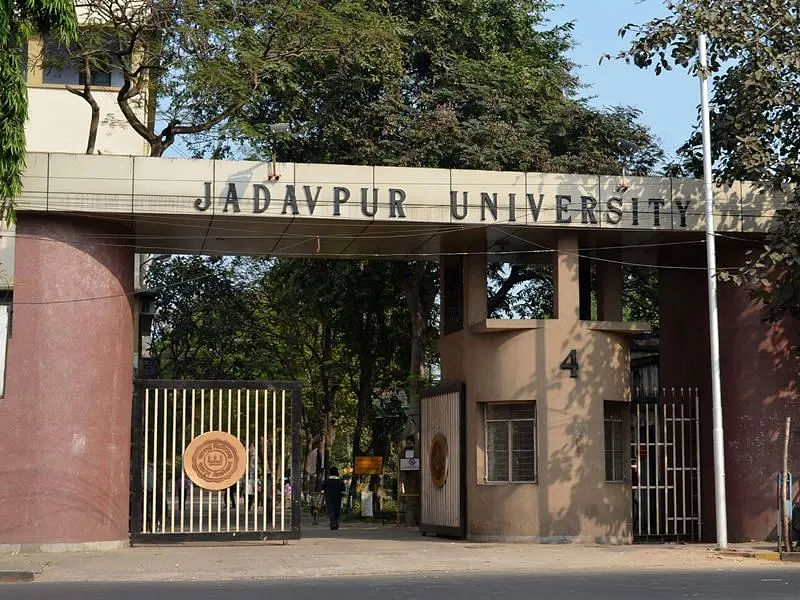
Jadavpur University
Kolkata,West Bengal
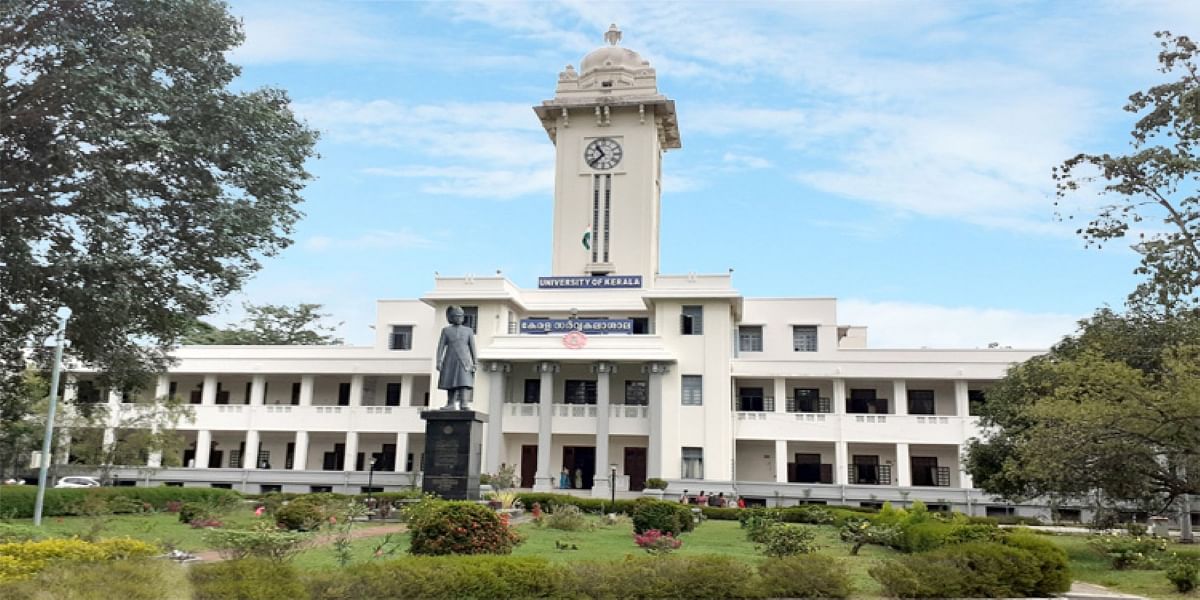
Kerala University
Thiruvananthapuram,Kerala
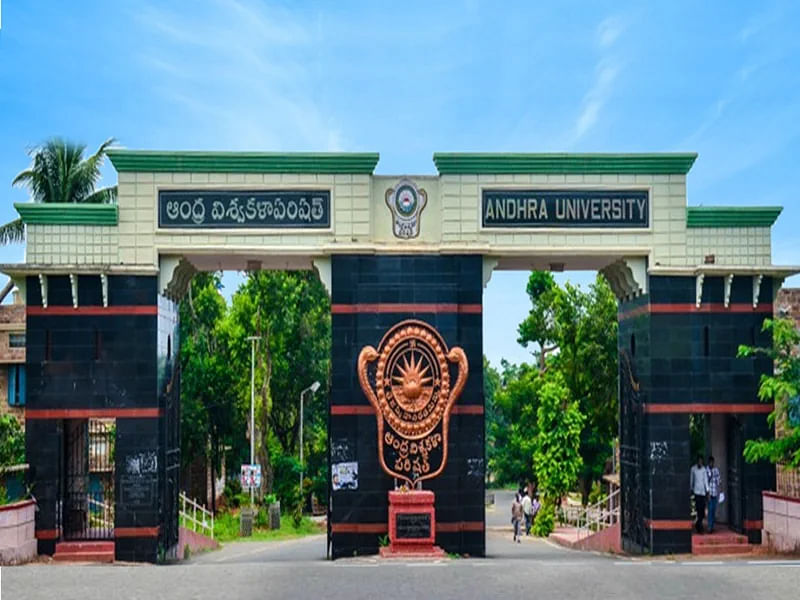
Andhra University
Visakhapatnam,Andhra Pradesh
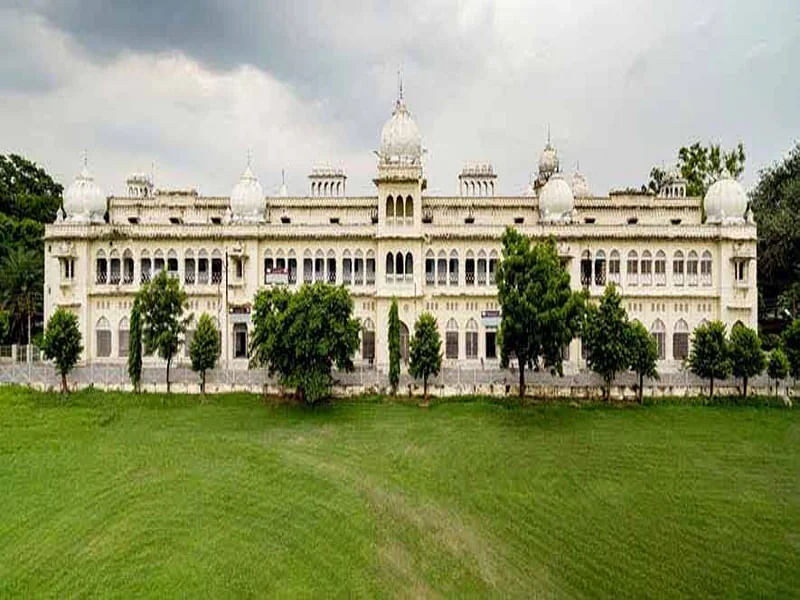
Osmania University
Hyderabad,Telangana
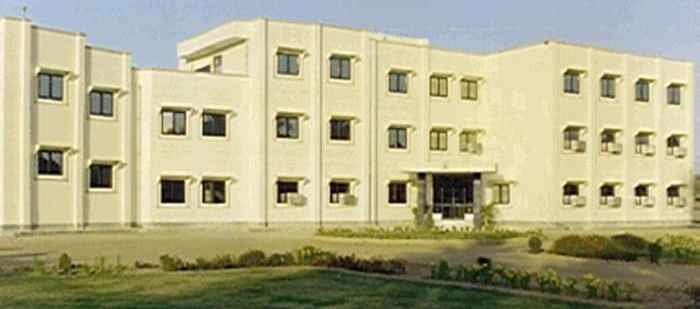
Banasthali Vidyapith
Jaipur,Rajasthan

Bharathidasan University
Tiruchirappalli,Tamil Nadu
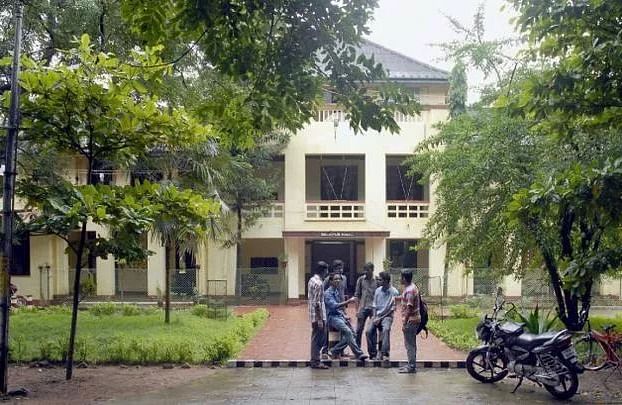
Madras Christian College
Chennai,Tamil Nadu
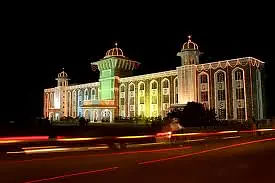
Shivaji University
Kolhapur,Maharashtra
Top Science Entrance Exams

- Eligibility Criteria

Result Date: Mar 22, 2024

B.Sc Geography Fee Structure

Get Free Scholarship worth 25000 INR


- University Reviews
- Career Guide
Important Facts
Ask any Question - CV Forum

Online/Distance Learning B.Sc In Travel & Tour Management (TTM) Course, Admission, Subjects, Colleges, Salary, and Career Options
College Vidya Team Dec 9, 2023 11.5K Reads
What is BSc Travel And Tourism Distance Education
BSc Travel and Tourism or Bachelor’s degree of Science in Travel and Tourism is a 3 years bachelor’s degree specialized in subjects related to travel and tourism. If you are interested in exploring new things, places, want to travel the whole world and want to earn money and make a career doing these activities or if you are keen to discover the historical places and different cultures of the different countries, then BSc in travel and tourism is one of the best course for you.
This course provides adequate knowledge about travel and tourism management that you can use to make your career in this field. There are many other courses linked to Travel and tourism, this is essential to know which course is best for you.
BSc in the Travel and Tourism Management course will allow you to understand the management skills in travel and tourism and it is the best course for the students who are interested to join the tour and travel industry.
This course can be done through regular classes and distance learning that is an online mode of study. The distance course is similar to the regular course and also has validity by the UGC. This course is specially designed according to the new concepts of education.
You can join any other diploma or degree course along with the distance BSc to sharpen up your knowledge. In distance BSc, you don’t need to take regular classes to complete the course, this will make it convenient to join two courses together for a better understanding.
The tours and travel industries in India are growing progressively. These industries will also positively affect the GDP of India by generating more profits and increasing foreign trade.
The Government of India is also taking the steps to increase more profits through the tour and travel industry. This will generate the demand for tour and travel management experts and also open up job opportunities. Acquiring the degree of BSc in TTM can be more beneficial to you and you can make your future bright with the help of this degree.
The admission mode for distance education in BSc TTM is online. The students can check the universities which are providing distance BSC TTM course and can take admission into a suitable university.
The aspirant can pay the fee for the admission through both offline and online mode. For online payment, they can use Debit Cards/ Credit Cards /UPI /Net Banking. For offline payment, they can make DD in the favor of the university through the bank.
The distance BSc TTM course will train the student through different skills. The course will give them a deep knowledge of the management skills, communication skills that will build the confidence of the students to step out into the new world.
The course will help students to set up good research and planning skills in themselves. Students who desire to make their career into tours and travel need to acquire these skills to grow in this industry and they will get the proper knowledge of these skills during the course.
The BSc Travel And Tourism Distance Education/ Correspondence UGC approved or not?
The BSc in Travel and Tourism through distance education is cent percent UGC approved. There are many distance learning universities which are providing this course.
Before taking admission into any university you need to just make sure that the university in which you are going to take admission is UGC approved or not as you should always take admission into the UGC or AICTE approved universities.
BSc Travel And Tourism Distance Education Subject
The subjects that you will study in distance BSc in the Travel and Tourism course are the same as in the regular course. The main subjects of this course are Travel & Tourism Industry, Principles of Marketing, Computer Fundamentals, Business Communication, Introduction to Accounting, Tourism Management, Communicative English, International Tourism, Art Heritage of India, Organizational Behavior, Quality Management in Tourism, Eco-Tourism, Strategic Management in Tourism, Human Resource Management, Principles & Concepts in Hospitality Management, Event Management, Business Economics, Stress Management, Environment & Ecology.
These subjects are specially designed to give you every single detail that you need to become a travel and tourism expert.
Syllabus of BSc Travel And Tourism Distance Education
There are elective subjects that you can choose in the 3rd and 4th semesters according to your interest. The list of those subjects is here:-
ELECTIVE SUBJECTS

Distance Learning BSc Travel And Tourism Course Fees
The fee structure for the distance learning BSc in Travel and Tourism is different in different universities. The fee for distance learning educational courses is a bit lower than the regular educational courses.
Students can easily afford the distance education BSc in TTM course. The approx amount of the fee for the course is about 10K – 1L. Some private universities charge higher fees. It depends upon you that where you want to take the admission.
Duration For BSc Travel And Tourism Distance Education
The duration of the distance learning BSc in the Travel and Tourism course is 3 years and can be completed in 6 years. The course is subdivided into 6 semesters. This is the advantage of all the distance learning courses that the time for completing the course can be extended. If you are not able to give the exam of any semester due to any circumstances you can give that exam along with other semesters.
Eligibility Criteria
The eligibility criteria for applying for the distance BSc in Tour and Travel is you need to clear the 12th standard with a minimum of 50% mark from a recognized board. Some universities also conduct entrance exam for the admission in the BSc in TTM.
Scholarships For BSc Travel And Tourism Distance Learning
There are lots of scholarship programs run by the government as well as private agencies to help the students in their higher studies. Some of them are interest-free loans or some of them are examination based prizes. The name of the scholarships that you can opt for are mentioned below:-
- Narotam Sekhsaria Scholarship Programme
- HDFC Educational Crisis Scholarship Support (ECSS)
- Kishore Vaigyanik Protsahan Yojana (KVPY)
- AcSIR Dr. APJ Abdul Kalam Summer Training Programme
- Indira Gandhi Scholarship for Single Girl Child
- IAS Bangalore notifies Summer Research Fellowship
- Post-Graduate Merit Scholarship for University Rank Holders
Some banks are also providing student loans in which students can take loans for their academics from the bank and when they start earning they can pay back their loan. Also, there are some programs that are run by the universities for the scholarship of the students. There is an option of the installments to pay the fees in every university. If you are doing a distance education course you can apply for the job and finance your own fees.
What are the benefits of BSc Travel And Tourism through Distance Learning?
- On-field experience- Through distance learning for BSc in TTM course students can get the work experience side by side. In the travel and tour field, you need on-field experience together with theoretical studies. While opting for the distance learning BSc in TTM you have the option to do a job along with your studies.
- Time-saving- This distance learning BSc in TTM course will also save your time as you don’t need to attend daily classes. You have time for the other activities that can enhance your career or you can apply for the job that will save your time.
- Cost-Friendly- The Distance education courses are pocket friendly for the students as the fee structure of the distance education courses is a bit less than the regular one. The students can choose any respective course according to their interests.
- Dual Course facility- Dual course facility- The students have the facility to apply for the two degrees together as per the new guidelines. By opting for this distance learning course students can apply for the other course according to their choice.
Scope For BSc Travel And Tourism Course Distance Learning
“Jobs will fill your pocket, adventures will fill your soul.” The travel and tourism industries are growing rapidly. This will generate the demands for the tour and travel experts. The growth of the tour and travel industry will open up more opportunities for a career in this field not only in India but also abroad.
As we know in this new generation everyone wants to travel the world. It is a good opportunity for you to Rome the world with great earnings. After completing the course you can become a tourist guide and can also apply for government jobs in tour and travel departments.
You can increase your salary package after completing this course. Your salary package will be approx 2L to 8L p.a. Some of the areas where you can apply after finishing this course are listed here:-
- Tourist Information Officer
- Transportation Services
- Travel Agencies
- Colleges & Institutions
- Travel & Ticketing Websites
- Visa & Travel Document Service Firms
- Travel Consultancy
- Tour Operator Offices
The posts where you can apply with the course that is BSc in TTM are mentioned here:-
- Tour Operator
- Associate and Analyst
- Management Trainee
- Travel Consultant
- Freelancer Travel Consultant
- Travel Executive
- Travel Sales Consultant
List of B.Sc Travel And Tourism Distance Education University
There are many universities that are providing this distance BSc in TTM course. But it is necessary to check whether the university is UGC, AICTE approved, or not. Some of the top universities that are UGC, AICTE approved providing these courses are here:-
- Madras Christian College (Autonomous), Chennai
- Sri Ram College of Arts and Science, Thiruvallur
- Chandigarh university
- Mahatma Gandhi University
- Lovely Professional University
FAQs (Frequently Asked Questions)
⭐ are bsc travel and tourism distance education/ correspondence courses valid.
Yes, BSc in Travel and Tourism from distance education or correspondence is completely valid as per the guidelines of the UGC.
⭐ What is the fee structure for the BSc Travel And Tourism course?
The fee structures are different in different colleges. The fee structure for the distance BSc in TTM is approximately 10,000 to 1,00,000.
⭐ Is BSc Travel And Tourism good for the future?
If you are interested in exploring things and places and also want to earn money doing these activities then yes the BSc in TTM is a great course for your future.
⭐ Why is tourism so important?
The industry of tour and travel is growing rapidly in India. This will generate career opportunities in this field. The tourism course will help you to attain knowledge about tour and travel management and you can make the path of a career.
⭐ Which BSc Travel And Tourism course have the highest salary?
The salary package depends upon your knowledge. The approx amount that you will get as a salary after completing the distance BSC in TTM is about 2L-8L.
⭐ What is the major subject of tourism?
The major subjects that you will learn in the BSc TTM course are Tour and travel management, Business management, Basic Accounting, and communication skills.
⭐ Which course is best in tourism?
The BSc in tour and travel is the best course for getting deep knowledge of tour and travel management. As in this course, you will not only learn about management, you will learn the skills that will help you in getting a job.
⭐ Is tourism a hard course?
No, the course of tour and travel is not a hard course. The course is theory-based; there is not any practical thing that will make the course more interesting and easy.
⭐ Does tourism have math?
No, mathematics is not included as a subject in BSc TTM rather than that there are some basic accounts that you will study during the course.
⭐ Is tourism management a good degree?
Yes, the tourism degree is a good degree as tourism in India is growing day by day and you can make a good career through this degree.

By College Vidya Team
Idea Alchemist / Concept Creator / Insight Generator
We are an online education platform where users can compare 100+ online universities on 30+ X-factors in just 2 minutes. With an active CV community, we have transformed online learning to quite an extent. With the CV Subsidy scheme, we contributing to GER in India while helping our learners with their finances in their “Chuno Apna Sahi” journey!
Every query is essential.
Our team of experts, or experienced individuals, will answer it within 24 hours.
Recommended for you
Tired of dealing with call centers!
Get a professional advisor for Career!
LIFETIME FREE
Rs.1499 (Exclusive offer for today)

MBA 7 yrs exp

M.Com 4 yrs exp

Kapil Gupta
MCA 5 yrs exp

The MoSCoW Method: A Practical Guide to Project Management
I. introduction to the moscow method, a. definition and overview.
Welcome to our comprehensive guide on the MoSCoW Method, a powerful technique used in project management to prioritize requirements and deliverables. Whether you’re a seasoned project manager or just starting your career in the field, understanding and implementing the MoSCoW Method can greatly enhance your project’s success.
B. Purpose and Benefits
The primary purpose of the MoSCoW Method is to help project teams prioritize their work based on the importance of requirements. By categorizing requirements into four distinct levels of priority, project managers can allocate resources effectively and ensure that the most critical features are delivered on time.
Some of the key benefits of using the MoSCoW Method include:
- Improved project focus and clarity
- Enhanced stakeholder engagement and satisfaction
- Efficient resource allocation
- Greater flexibility in managing project scope
- Increased chances of project success
C. History and Origins
The MoSCoW Method was first introduced in the 1990s by Dai Clegg, a British software engineer. It gained popularity in the field of Agile Project Management and has since been widely adopted across various industries. The acronym “MoSCoW” stands for Must, Should, Could, and Won’t, representing the four priority levels used in the method.
II. Understanding the MoSCoW Method
A. meaning of moscow acronym.
The MoSCoW acronym represents the four priority levels used in the method:
- Must: These are the requirements that are critical for project success. They must be delivered within the specified timeframe.
- Should: These requirements are important but not critical. They should be delivered if possible, but their omission won’t jeopardize the project’s success.
- Could: These requirements are desirable but not essential. They could be included if there is enough time and resources available.
- Won’t: These requirements are explicitly excluded from the project scope. They won’t be delivered in the current phase of the project.
B. Key Principles and Concepts
At the core of the MoSCoW Method are the following key principles:
- Prioritization: The method emphasizes the importance of prioritizing requirements based on their impact on project success.
- Collaboration: MoSCoW encourages collaboration among project stakeholders to ensure a shared understanding of priorities.
- Flexibility: The method allows for changes in priorities as the project progresses, providing flexibility to adapt to evolving needs.
C. Roles and Responsibilities in Using the Method
Implementing the MoSCoW Method involves the following key roles:
- Project Manager: Responsible for facilitating the prioritization process and ensuring alignment with project goals.
- Product Owner: Represents the interests of the stakeholders and provides input on requirements prioritization.
- Development Team: Collaborates with the project manager and product owner to understand and deliver the prioritized requirements.
III. Applying the MoSCoW Method in Project Management
A. project initiation and requirements gathering.
Before applying the MoSCoW Method, it is crucial to define project goals and objectives. This ensures a clear understanding of the desired outcomes and helps in identifying the most critical requirements.
- Defining Project Goals and Objectives: Clearly articulate what the project aims to achieve and how it aligns with the organization’s strategic objectives.
- Identifying and Prioritizing Project Requirements: Gather all the requirements and categorize them into the MoSCoW priority levels. Engage stakeholders to ensure their input is considered.
- Creating the MoSCoW Prioritization Matrix: Use a matrix to visualize and communicate the prioritization of requirements. This helps in making informed decisions during the project lifecycle.
B. MoSCoW Method in Project Planning
Once the requirements are prioritized, the next step is to break them down into deliverables and create a project roadmap.
- Breaking Down Project Requirements into Deliverables: Divide the requirements into smaller, manageable tasks or deliverables. This ensures clarity and enables better estimation and resource allocation.
- Assigning Priorities to Each Deliverable: Allocate priorities to each deliverable based on the MoSCoW levels. This helps in determining the order in which the deliverables should be completed.
- Creating a Project Roadmap Using MoSCoW Prioritization: Develop a timeline or Gantt chart that reflects the sequence of deliverables based on their priorities. This helps in visualizing the project’s progress.
C. MoSCoW Method in Project Execution and Control
During the execution and control phase, the MoSCoW Method helps in managing project scope, monitoring priorities, and facilitating effective communication.
- Managing Project Scope and Changes: Regularly review and reassess the project’s scope to ensure alignment with the prioritized requirements. Address any changes or additions through a change management process.
- Monitoring and Controlling Project Priorities: Continuously monitor the progress of deliverables and ensure that the priorities are being adhered to. Adjust the plan if necessary to maintain alignment with the MoSCoW prioritization.
- Communicating and Collaborating Based on Priorities: Foster open communication and collaboration among project stakeholders, keeping them informed about the progress and any changes in priorities.
IV. Advantages and Limitations of the MoSCoW Method
A. advantages of using moscow in project management.
The MoSCoW Method offers several advantages when applied in project management:
- Clear Prioritization: It provides a structured approach to prioritize requirements, ensuring that the most critical ones are addressed first.
- Improved Stakeholder Satisfaction: By involving stakeholders in the prioritization process, their needs and expectations are considered, leading to greater satisfaction.
- Efficient Resource Allocation: The method helps in allocating resources effectively, focusing efforts on delivering the most valuable features.
- Flexibility in Managing Scope: MoSCoW allows for changes in priorities, enabling project teams to adapt to evolving requirements without compromising project success.
- Increased Project Success Rate: Prioritizing requirements based on their impact on project success significantly increases the chances of successful project completion.
B. Limitations and Potential Challenges
While the MoSCoW Method offers numerous benefits, it is essential to be aware of its limitations and potential challenges:
- Subjectivity: Prioritization can be subjective, and different stakeholders may have varying opinions on what is a “Must” or a “Should” requirement.
- Changing Priorities: Priorities may change throughout the project lifecycle, requiring continuous monitoring and adjustment.
- Resource Constraints: Limited resources can pose challenges in delivering all the requirements, especially when there are many “Must” requirements.
- Managing Stakeholder Expectations: Balancing stakeholder expectations and managing their disappointment when certain requirements are not included can be challenging.
C. Tips and Best Practices for Successful Implementation
To ensure successful implementation of the MoSCoW Method, consider the following tips and best practices:
- Involve Key Stakeholders: Engage stakeholders from the beginning to ensure their buy-in and alignment with the prioritization process.
- Regularly Review and Reassess Priorities: Priorities may change, so it’s crucial to review and reassess them periodically to maintain alignment with project goals.
- Communicate Clearly: Clearly communicate the MoSCoW Method and its implications to all project stakeholders to avoid misunderstandings.
- Be Flexible: Embrace changes and be open to adjusting priorities as needed to accommodate evolving project requirements.
- Document Decisions: Keep a record of the prioritization decisions and the rationale behind them. This helps in maintaining transparency and resolving disputes or conflicts.
V. Case Studies and Examples
A. real-life examples of moscow method in action.
Let’s explore some real-life examples of how the MoSCoW Method has been successfully applied in different projects:
Example 1: A software development project for a healthcare organization:
- Must: Implement a secure login system and patient data encryption.
- Should: Develop a reporting module for generating customized reports.
- Could: Integrate with external APIs to fetch real-time data from medical devices.
- Won’t: Include social media integration for patient feedback.
Example 2: A construction project for a residential building:
- Must: Complete the foundation and structural work within the specified timeline.
- Should: Install energy-efficient windows and doors.
- Could: Include a swimming pool in the backyard.
- Won’t: Build a rooftop garden.
B. Case Studies Showcasing Successful Implementation
Here are a few case studies that highlight successful implementation of the MoSCoW Method:
Case Study 1: XYZ Company’s ERP Implementation:
In this case, the MoSCoW Method helped the project team prioritize the ERP system’s requirements. By focusing on the “Must” and “Should” requirements, they were able to deliver a functional system within the allocated budget and timeline.
Case Study 2: ABC Organization’s Website Redesign:
Through the MoSCoW Method, the organization identified the critical features that needed to be included in the website redesign. By prioritizing these requirements, they successfully launched the new website on time, meeting the stakeholders’ expectations.
C. Lessons Learned and Key Takeaways from Case Studies
From the case studies mentioned above, we can draw some valuable lessons and key takeaways:
- Effective prioritization: Prioritizing requirements based on their impact on project success is crucial for delivering successful outcomes.
- Collaboration: Involving stakeholders in the prioritization process ensures their needs and expectations are considered, leading to greater satisfaction.
- Flexibility: The MoSCoW Method allows for changes in priorities, enabling project teams to adapt to evolving requirements without compromising project success.
- Documentation: Keeping a record of prioritization decisions helps in maintaining transparency and resolving disputes or conflicts.
VI. Conclusion
A. recap of key points discussed.
In this comprehensive guide, we explored the MoSCoW Method, its definition, purpose, and benefits. We discussed its history and origins, as well as the meaning of the MoSCoW acronym. We delved into the key principles, concepts, and roles involved in using the method. Furthermore, we provided practical insights on applying the MoSCoW Method in project management, including project initiation, planning, execution, and control.
B. Importance of MoSCoW Method in Project Management
The MoSCoW Method offers a structured approach to prioritize requirements, ensuring that the most critical ones are addressed first. By involving stakeholders and fostering collaboration, it enhances stakeholder satisfaction and project success. The method’s flexibility allows project teams to adapt to changing priorities, enabling efficient resource allocation and effective scope management.
C. Encouragement for Further Exploration and Implementation
We encourage you to further explore the MoSCoW Method and consider implementing it in your project management endeavors. By following the tips and best practices provided, you can maximize the benefits of the method and overcome potential challenges. Remember to document decisions and learn from real-life case studies to continuously improve your application of the MoSCoW Method.
Happy prioritizing and successful project management!
Related Terms

How it works
For Business
Join Mind Tools
Article • 9 min read
The MoSCoW Method
Understanding project priorities.
Written by the Mind Tools Content Team
(Also Known As MoSCoW Prioritization and MoSCoW Analysis)

You probably use some form of prioritized To-Do List to manage your daily tasks. But what happens when you're heading up a project that has various stakeholders, each of whom has a different opinion about the importance of different requirements? How do you identify the priority of each task, and communicate that to team members, stakeholders and customers alike?
This is when it's useful to apply a prioritizing tool such as the MoSCoW method. This simple project-management approach helps you, your team, and your stakeholders agree which tasks are critical to a project's success. It also highlights those tasks that can be abandoned if deadlines or resources are threatened.
In this article, we'll examine how you can use the MoSCoW method to prioritize project tasks more efficiently, and ensure that everyone expects the same things.
What Is the MoSCoW Method?
The MoSCoW method was developed by Dai Clegg of Oracle® UK Consulting in the mid-1990s. It's a useful approach for sorting project tasks into critical and non-critical categories.
MoSCoW stands for:
- Must – "Must" requirements are essential to the project's success, and are non-negotiable. If these tasks are missing or incomplete, the project is deemed a failure.
- Should – "Should" items are critical, high-priority tasks that you should complete whenever possible. These are highly important, but can be delivered in a second phase of the project if absolutely necessary.
- Could – "Could" jobs are highly desirable but you can leave them out if there are time or resource constraints.
- Would (or "Won't") – These tasks are desirable (for example, "Would like to have…") but aren't included in this project. You can also use this category for the least critical activities.
The "o"s in MoSCoW are just there to make the acronym pronounceable.
Terms from Clegg, D. and Barker, R. (1994). ' CASE Method Fast-Track: A RAD Approach ,' Amsterdam: Addison-Wesley, 1994. Copyright © Pearson Education Limited. Reproduced with permission.
People often use the MoSCoW method in Agile Project Management . However, you can apply it to any type of project.
MoSCoW helps you manage the scope of your project so that it isn't overwhelmingly large. It is particularly useful when you're working with multiple stakeholders, because it helps everyone agree on what's critical and what is not. The four clearly labeled categories allow people to understand a task's priority easily, which eliminates confusion, misunderstanding, conflict, and disappointment.
For example, some project management tools sort tasks into "high-," "medium-," and "low-" priority categories. But members of the team might have different opinions about what each of these groupings means. And all too often, tasks are labeled "high" priority because everything seems important. This can put a strain on time and resources, and ultimately lead to the project failing.
Using the MoSCoW Method
Follow the steps below to get the most from the MoSCoW method. (This describes using MoSCoW in a conventional "waterfall" project, however the approach is similar with agile projects.)
Step 1: Organize Your Project
It's important that you and your team fully understand your objectives before starting the project.
Write a business case to define your project's goals, its scope and timeline, and exactly what you will deliver. You can also draw up a project charter to plan how you'll approach it.
Next, conduct a stakeholder analysis to identify key people who are involved in the project and to understand how its success will benefit each of them.
Step 2: Write out Your Task List
Once you understand your project's objectives, carry out a Gap Analysis to identify what needs to happen for you to meet your goals.
Step 3: Prioritize Your Task List
Next, work with your stakeholders to prioritize these tasks into the four MoSCoW categories: Must, Should, Could, and Would (or Won't). These conversations can often be "difficult," so brush up on your conflict resolution, group decision making and negotiating skills beforehand!
Rather than starting with all tasks in the Must category and then demoting some of them, it can be helpful to put every task in the Would category first, and then discuss why individual ones deserve to move up the list.
Step 4: Challenge the MoSCoW List
Once you've assigned tasks to the MoSCoW categories, critically challenge each classification.
Be particularly vigilant about which items make it to the Must list. Remember, it is reserved solely for tasks that would result in the project failing if they're not done.
Aim to keep the Must list below 60 percent of the team's available time and effort. The fewer items you have, the higher your chance of success.
Try to reach consensus with everyone in the group. If you can't, you then need to bring in a key decision-maker who has the final say.
Step 5: Communicate Deliverables
Your last step is to share the prioritized list with team members, key stakeholders and customers.
It's important that you communicate the reasons for each categorization, particularly with Must items. Encourage people to discuss any concerns until people fully understand the reasoning.
Zhen is a project manager for a large IT organization. She's working with a team of designers, marketers and developers to redesign a large corporate client's website.
At the initial meeting, each group has strong opinions about which tasks are most important to the project's success, and no one wants to give up their "high priority" objective.
For example, the marketing team is adamant that the new website should gather visitors' personal information, for use in future marketing campaigns.
Meanwhile, the designers are arguing that, while this is important, the site may be more successful if it had a professionally produced streaming video. They also want a feed streaming onto the website's home page from the client's social networking accounts.
The developers counter that the current prototype design won't translate well onto mobile devices, so the top priority is retrofitting the site so people can view it on these.
Zhen can see that, while each priority is important, they're not all critical to the project's success. She decides to use the MoSCoW method to help the group reach consensus on which task is truly "mission critical."
She starts with a key question: "If I came to you the night before rollout and the following task was not done, would you cancel the project?" This question helped everyone in the group drill down to the project's most important priority.
The group finally agreed on the following priorities:
- Must – The retrofit website must be easily viewable on mobile devices.
- Should – There should be a social networking stream included.
- Could – There could be a streaming video on the site to help users.
- Would – Personal information would be gathered for future marketing efforts, but not on this occasion.
The MoSCoW method helped everyone agree on what was truly important for the project's final success.
The MoSCoW method is a simple and highly useful approach that enables you to prioritize project tasks as critical and non-critical. MoSCoW stands for:
- Must – These are tasks that you must complete for the project to be considered a success.
- Should – These are critical activities that are less urgent than Must tasks.
- Could – These items can be taken off the list if time or resources are limited.
- Would – These are tasks that would be nice to have, but can be done at a later date.
The benefit of the MoSCoW approach is that it makes it easy for team members and key stakeholders to understand how important a task is for a project's success.
Apply This to Your Life
Try using the MoSCoW method to prioritize your daily tasks. Look at what you completed at the end of the day. Did prioritizing enable you to get more done?
You've accessed 1 of your 2 free resources.
Get unlimited access
Discover more content
How to use burndown charts.
Keeping Your Projects on Track
Kanban Boards
Managing the Delivery of Your Projects
Add comment
Comments (0)
Be the first to comment!

Try Mind Tools for FREE
Get unlimited access to all our career-boosting content and member benefits with our 7-day free trial.
Sign-up to our newsletter
Subscribing to the Mind Tools newsletter will keep you up-to-date with our latest updates and newest resources.
Subscribe now
Business Skills
Personal Development
Leadership and Management
Member Extras
Most Popular
Latest Updates

Mind Tools Member Newsletter August 15, 2024

Mind Tools Newsletter August 8, 2024
Mind Tools Store
About Mind Tools Content
Discover something new today
Mind tools member newsletter august 1, 2024.
Cross-Cultural Leadership Lessons From Kenya and Bhutan
Transactional Analysis
Learning the Games People Play
How Emotionally Intelligent Are You?
Boosting Your People Skills
Self-Assessment
What's Your Leadership Style?
Learn About the Strengths and Weaknesses of the Way You Like to Lead
Recommended for you
Tips for preparing your personal development plan.
Plan Your Personal Growth
Business Operations and Process Management
Strategy Tools
Customer Service
Business Ethics and Values
Handling Information and Data
Project Management
Knowledge Management
Self-Development and Goal Setting
Time Management
Presentation Skills
Learning Skills
Career Skills
Communication Skills
Negotiation, Persuasion and Influence
Working With Others
Difficult Conversations
Creativity Tools
Self-Management
Work-Life Balance
Stress Management and Wellbeing
Coaching and Mentoring
Change Management
Team Management
Managing Conflict
Delegation and Empowerment
Performance Management
Leadership Skills
Developing Your Team
Talent Management
Problem Solving
Decision Making
Member Podcast
Member Newsletter
- Contact sales
Start free trial
How to Prioritize With the MoSCoW Method

Do you need help prioritizing tasks when managing a project? There’s an acronym for that! It’s called the MoSCow method and it’s a great technique to help with prioritization.
What Is the MoSCoW Method?
The MoSCoW method is a technique that helps organizations prioritize what should be done first in a project. It is done in four steps that follow the acronym MoSCoW, which stands for must have, should have, could have and will not have. It’s used by anyone who needs to prioritize their work and is especially useful in project management.
The MoSCoW method can help when project planning. ProjectManager is award-winning project management software that can take the results of your MoSCow method and organize them into a project plan. Our powerful Gantt charts organize tasks, link all four task dependencies to avoid delays and can set a baseline to capture the project plan and compare it to the actual progress to ensure you stay on schedule. Get started with ProjectManager today for free.
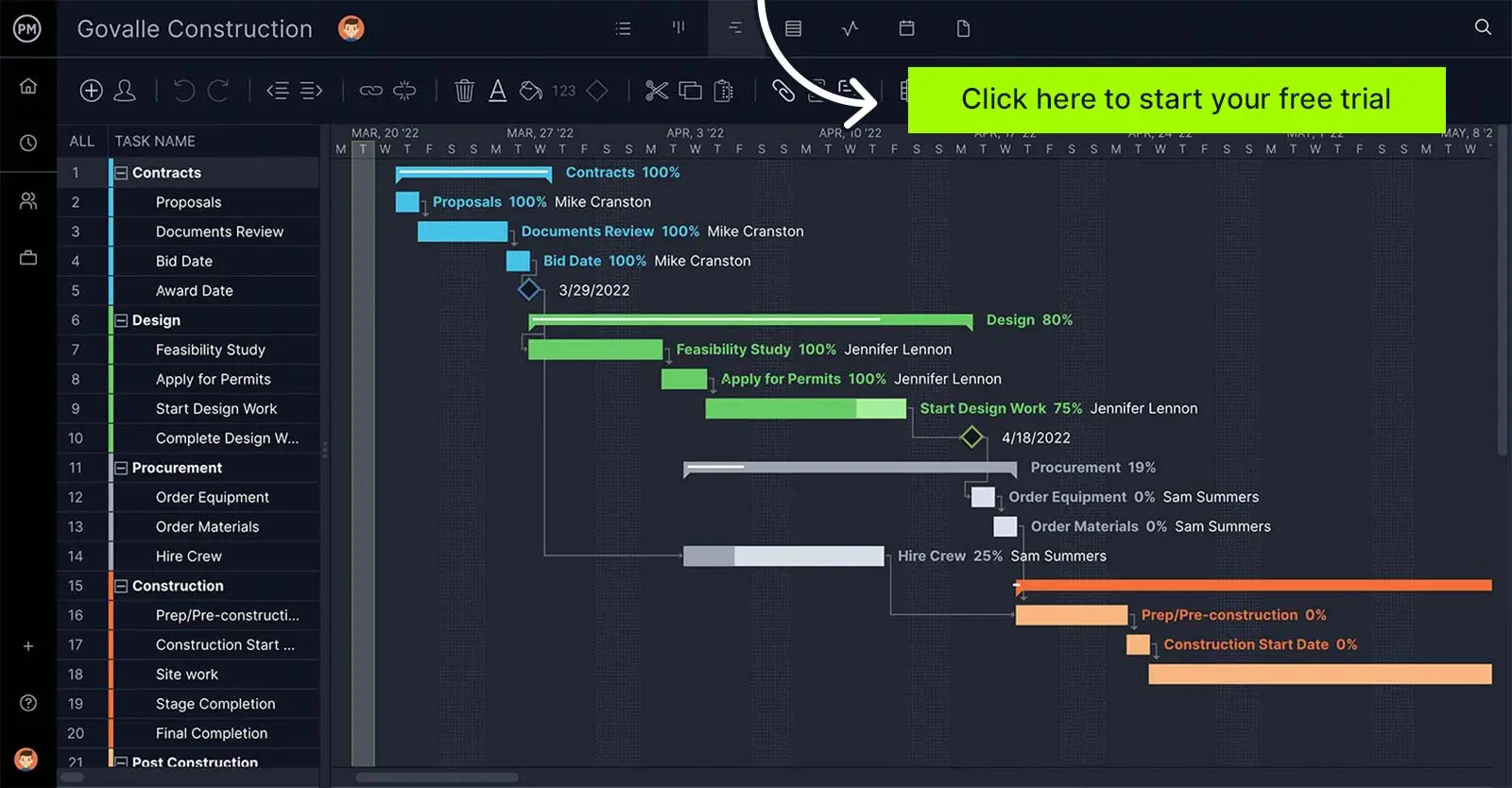
MoSCoW Prioritization Categories
Managing a project is often about managing what you will – and won’t! – get done in the given project timeline . When there are no priorities set, projects can quickly become free-for-alls, with the loudest voices in the room getting their work prioritized over others, often not for the benefit of the project or the organization.
But there’s a different approach. It’s called the MoSCoW method for defining and managing requirements and tasks in a project . Here is a list to clarify what those requirements are:
Must-Have Requirements (M)
Another way to refer to this is as the minimum usable subset (MUS) or what the project must deliver. In other words, the project must deliver these on the target date for the project to remain on track. No delay is acceptable. It is either going to take the project off track, it’s unsafe or even illegal not to have this done by the time given in the project’s business case .
A way to understand if you’re dealing with a MUS is by asking yourself, “What happens if this isn’t met?” If the answer is, “The project fails ,” then you have a MUS. Any workaround that can be devised to continue with the project and not jeopardize its success, means this isn’t a MUS.
Should-Have Requirements (S)
This type of requirement is almost as important as a MUS, but it’s not vital to the success of the project. In other words, the project doesn’t depend on this requirement. You might not want to leave it out, as it could have a great impact on the project, but in the end, it can be done without causing any irreparable harm. Again, leaving out this requirement means a lot of work (finding a solution, changing stakeholders’ expectations, maybe experiencing some inefficiency), but the project can go on.
Could-Have Requirements (C)
The difference between a should-have requirement and a could-have requirement is simply by figuring out the degree of pain that would be caused by not meeting it. That is, how will it impact the business value of the project, how many people would be affected, etc. Therefore, a could-have requirement is something you’d like but is less important than a should-have requirement. There will be an impact if it’s left out of the project, but less than the impact of a should-have requirement.
What We Will Not Have This Time (W)
Here is where you can collect those requirements that are not feasible for a specific release. Maybe next time, but the project remains strong without them. This is a great way to avoid project scope creep . Once initiatives are placed in the not-have-time category, teams know that they’re not a priority for this go-around and can place them on the back burner and out of their mind. This allows them to focus more sharply on those requirements that are important to the project.
What Is the MoSCoW Method Used For?
The MoSCow method can be of use to anyone who has work and needs to prioritize that work to know what’s essential and what can be ignored. It’s mostly used in product development, software development and project management. In project management that helps determine which tasks, requirements, products and user stories (in agile projects) the team needs to prioritize.
How to Implement the MoSCoW Method in 3 Steps
The MoSCoW method is a valuable tool, but only if you know how to use it. Here are three steps that will help you use the MoSCoW method when prioritizing your project.
1. Gather Project Requirements
Start by identifying all project requirements . Just make a giant list and be as thorough as possible. You don’t want to leave out anything that might prove essential to the project.
2. Prioritize Project Requirements
Now go through that list and attach a letter to each, according to the MoSCoW method of M for must-have, S for should have, C could have and W for what you won’t have. This allows you to prioritize the work and know what can be put aside to focus on what’s important.
3. Track the Completion of Project Deliverables
Now that you’ve classified your requirements, you can carry out the work in a timely manner. Tracking that work ensures that you don’t miss any deadlines and that all high-priority requirements will be met.
Benefits of the MoSCoW Method
The clear benefit of using the MoSCoW method is that it provides a means to prioritize work and know what is essential to the project and what can be ignored if time and cost prevent one from completing every requirement. But there are more advantages of the MoSCoW method, some of which we list below.
Helps Ensure Stakeholder Satisfaction
Stakeholders have a vested interest in the project and the project should satisfy their expectations . The MoSCoW method helps manage stakeholders by getting them to all agree on the prioritization of requirements and, therefore, helps to resolve any conflicts that might arise over the execution of those requirements.
It’s Easy to Understand and Implement
Using the MoSCoW method identifies the priority of project requirements. This information can then be disseminated to the project team so it’s clear to everyone what must be done. Now the team understands what’s prioritized and can implement those requirements first.
Helps Teams Cut Unnecessary Costs
The MoSCoW method allows everyone on the project team to know what they have to get done first, which increases revenue by decreasing operational costs, improving productivity and increasing customer satisfaction.
Moscow Method Example
Leadership guru Susanne Madsen leads this training video on how to use the MoSCoW Method to prioritize your requirements in a project.
How ProjectManager Helps You Prioritize
ProjectManager is online project management software that can make sure your requirements are being met throughout the life cycle of the project. Because our software gives you real-time data, you’re able to meet your priorities.
Our real-time dashboard shows real-time data that is displayed over six different project metrics. These numbers are crunched and illustrated in colorful, easy-to-read graphs and charts that keep project managers keenly assessed on the progress of their priorities.
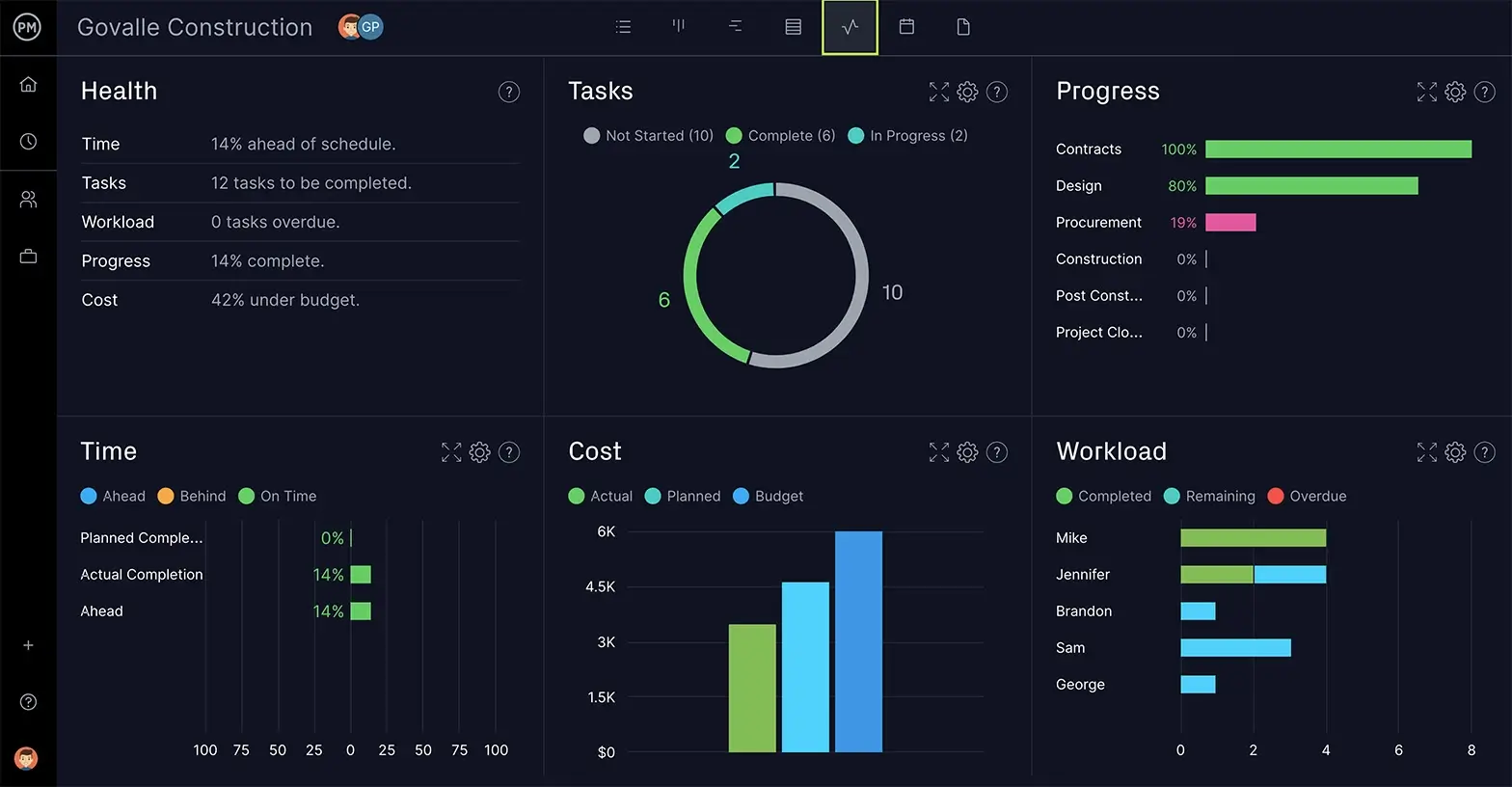
Workflow is also visualized with kanban boards that keep teams focused on their priorities. Online Gantt charts can link dependencies and teams can collaborate at the task level, adding comments, documents and images.
There’s so much more that ProjectManager offers. To get a full picture of what we can do to help you better manage your next project, try our free 30-day trial today.

Deliver your projects on time and on budget
Start planning your projects.

Home » Agile Development » Prioritizing Requirements with MoSCoW Method: A Guide for Agile Projects
Prioritizing Requirements with MoSCoW Method: A Guide for Agile Projects
- Posted on March 28, 2023
- / Under Agile & Scrum , Agile Development , Project Management
The MoSCoW method is a prioritization technique used in project management, software development, and business analysis. It helps to prioritize requirements based on their importance and urgency, and allows project managers to allocate resources and budget accordingly. In this article, we will explore the MoSCoW method and provide an example of its implementation.
What is the MoSCoW Method?
The MoSCoW method is a prioritization technique that categorizes requirements into four groups: Must-haves, Should-haves, Could-haves, and Won’t-haves. The acronym MoSCoW stands for:
- Must have: critical requirements that are essential for the project’s success. These requirements are mandatory and must be included in the project scope.
- Should have: important requirements that are necessary for the project’s success but can be delayed if necessary. These requirements are important, but not critical, and can be deferred to a later phase of the project.
- Could have: desirable requirements that are not essential for the project’s success, but can enhance the project’s value. These requirements are optional and can be included if time and budget allow.
- Won’t have: requirements that are not needed for the project’s success and are not included in the project scope.
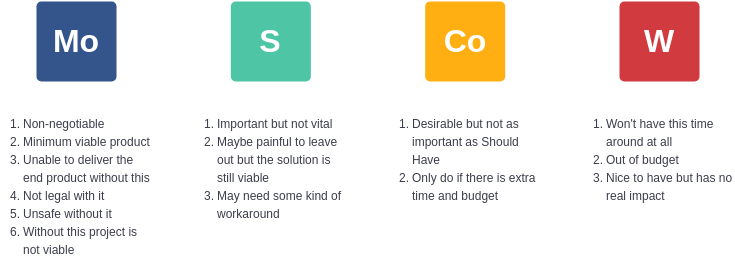
The MoSCoW method helps project managers prioritize requirements based on their importance and urgency. It allows them to focus on the critical requirements and allocate resources and budget accordingly.
Example of MoSCoW Method
Let’s consider an example of a software development project to understand how the MoSCoW method works.
Suppose a company wants to develop a new mobile app for its customers. The app should allow customers to order products, track their orders, and receive notifications. The company also wants to include some additional features to make the app more appealing to customers.
The project team identifies the following requirements:
- Must have: The app must allow customers to order products, track their orders, and receive notifications.
- Should have: The app should have a search feature that allows customers to search for products, and a payment feature that allows customers to pay for their orders using various payment methods.
- Could have: The app could have a loyalty program feature that rewards customers for their purchases, and a referral program feature that incentivizes customers to refer the app to their friends and family.
- Won’t have: The app won’t have a social media integration feature that allows customers to share their purchases on social media platforms.
Using the MoSCoW method, the project team has prioritized the requirements based on their importance and urgency. The must-have requirements are critical for the success of the project and must be included in the app. The should-have requirements are important, but can be deferred to a later phase of the project if necessary. The could-have requirements are optional and can be included if time and budget allow. The won’t-have requirements are not needed for the project’s success and are not included in the project scope.
Real-life Example – CRM System
Project Description: Development of a Customer Relationship Management (CRM) System
The objective of this Agile project is to develop a CRM system for a small business that specializes in providing customized solutions to its clients. The CRM system will be designed to streamline the sales process and improve customer interactions, allowing the business to enhance customer satisfaction and loyalty.
The project will follow the Agile methodology, which involves iterative and incremental development. The Agile team will work closely with the client to gather requirements, develop prototypes, and deliver functional software increments in short iterations, typically two weeks.
Identify a List of User Stories
To create the list of user stories, you can considered the different roles that would interact with the system, such as sales representatives, managers, and customers, and thought about the various tasks they would need to perform in order to achieve their goals. you can also considered the different types of data that would need to be stored and managed within the system, such as customer information, sales data, and marketing campaigns.
Based on this analysis, you can then generated a list of user stories that covered a broad range of functionality, from lead tracking and customer service, to sales proposals and reporting. The list of user stories is intended to provide a starting point for the development team to use in prioritizing and planning the development of the CRM system.
Here is a list of user stories for the CRM system development project:
- As a sales representative, I want to be able to track all of my leads in one place so that I can easily manage my sales pipeline.
- As a sales manager, I want to be able to view and monitor my team’s progress in real-time so that I can provide coaching and support as needed.
- As a customer service representative, I want to be able to view all of a customer’s interactions with our company so that I can provide personalized support.
- As a marketing manager, I want to be able to segment our customers based on their preferences and behavior so that I can target them with relevant campaigns.
- As a customer, I want to be able to view my purchase history and account information so that I can easily manage my relationship with the company.
- As a customer service representative, I want to be able to log and track customer complaints and inquiries so that I can ensure that they are addressed in a timely manner.
- As a sales representative, I want to be able to generate quotes and proposals quickly and easily so that I can close deals faster.
- As an administrator, I want to be able to manage user permissions and access levels so that I can control who has access to sensitive information.
- As a sales representative, I want to be able to schedule and manage appointments with my clients so that I can stay organized and on top of my schedule.
- As a manager, I want to be able to generate reports on sales performance, customer satisfaction, and other metrics so that I can make informed business decisions.
These user stories cover a range of functionality that the CRM system should provide. The development team can use these user stories to prioritize the most important features for the system, and to ensure that the system meets the needs of all stakeholders.
In table format, let’s present a clear and concise summary of the 10 user stories related to a business scenario to provide an overview of the user stories.
The table provides information on the user role, the specific goal they want to achieve, and the user story number to easily reference each story. By organizing the user stories in a table, it is easier to understand and prioritize the features that need to be developed to meet the needs of the stakeholders involved in the project. This table can serve as a reference for the development team to design and implement features that align with the needs of the end-users and stakeholders.
Prioritize the User Stories
It is important to prioritize the user stories based on their business value and impact on the project goals. This ensures that the development effort is focused on the most important and valuable features, and that the project can be delivered on time and within budget.
Prioritization can be done using various techniques such as the MoSCoW method, which categorizes user stories as “must-haves,” “should-haves,” “could-haves,” and “won’t-haves.” User stories categorized as “must-haves” are the most critical and should be developed first, while “should-haves” and “could-haves” can be developed later in subsequent iterations or releases.
Here’s a table for the 10 user stories mentioned earlier, with the relevant information and prioritization based on the MoSCoW method:
In this table, the user stories are listed in order of priority, with the “must-have” features listed first, followed by the “should-haves” and “could-haves.” The “won’t-haves” feature is not planned for implementation in this project, but may be considered for future development.
By prioritizing the user stories, the development team can ensure that the most critical features are developed first, providing value to the stakeholders and enabling the project to meet its objectives within the time and budget constraints.
Example: A Scrum Development Plan for the CRM
here is a high-level outline for a Scrum development plan to start the agile project. However, the specific details of the plan will depend on the project requirements, team structure, and other factors. Here’s an example of a Scrum development plan:
- Define the Product Backlog: The first step is to define the product backlog, which is a prioritized list of all the features, functionalities, and requirements that need to be implemented in the project. This backlog will be maintained throughout the project and will be continually refined and updated based on the changing needs of the stakeholders.
- Conduct Sprint Planning: After the product backlog has been defined, the team will conduct a sprint planning meeting to select a set of user stories from the backlog to be developed in the upcoming sprint. The team will estimate the effort required for each user story, and select the user stories that can be completed within the sprint timeframe.
- Conduct Daily Scrum Meetings : Once the sprint has started, the team will conduct daily scrum meetings to review progress, identify any obstacles or challenges, and adjust the plan as needed. The daily scrum meetings should be short and focused, with each team member providing an update on their progress.
- Develop the Product Increment: During the sprint, the team will work on developing the selected user stories, focusing on delivering a working product increment by the end of the sprint. The team will collaborate closely, with developers, testers, and other team members working together to deliver the product increment.
- Conduct Sprint Review: At the end of the sprint, the team will conduct a sprint review meeting to demonstrate the product increment to the stakeholders, gather feedback, and review the progress made during the sprint.
- Conduct Sprint Retrospective: After the sprint review, the team will conduct a sprint retrospective meeting to review the sprint process, identify areas for improvement, and plan for the next sprint.
- Repeat the process: The team will repeat this process for each subsequent sprint, continuing to refine and update the product backlog, and focusing on delivering a working product increment at the end of each sprint.
This Scrum development plan provides a framework for managing the agile project, with regular meetings and reviews to ensure that the project is on track and delivering value to the stakeholders.
The article discusses the MoSCoW method, which is a prioritization technique used in Agile project management to prioritize project requirements. The MoSCoW method divides requirements into four categories: Must-have, Should-have, Could-have, and Won’t-have. The article provides a real-life example of an Agile project and how to identify user stories for the project. The user stories are then prioritized using the MoSCoW method, with the Must-have requirements given top priority.
The article also outlines a Scrum development plan, which includes defining the product backlog, conducting sprint planning, daily scrum meetings, developing the product increment, sprint review, sprint retrospective, and repeating the process. The Scrum development plan provides a framework for managing the Agile project, ensuring that the project is on track, and delivering value to stakeholders.
Leave a Comment Cancel reply
You must be logged in to post a comment.

- Visual Paradigm Online
- Request Help
- Customer Service
- Community Circle
- Demo Videos
- Visual Paradigm
- YouTube Channel
- Academic Partnership

IMAGES
COMMENTS
Everything you need to know about B.Sc. in Travel and Tourism Management course - details, duration, eligibility, colleges, admission, jobs and salary.
The Department of Geography, Tourism and Travel Management started its journey in the year 2005. The curriculum includes the papers of both Geography and Tourism in each semester. It covers all the branches of Geography and recent concepts of Geographic Information System (GIS). Innovative papers like logistics in tourism, travel forms and ...
Travel and Tourism Management majors will have the opportunity to gain real-world experience through internships in local tourism-related environments such as hotels, festivals, museums, media companies, and travel agencies.
We would like to show you a description here but the site won't allow us.
Know all about B.Sc in Travel & Tourism Management course details, syllabus, colleges, career options and salary scope at CollegeDekho
Learning Outcomes: Student will be able to understand fundamentals of Geography, climatic regions of world and International Date Line. To understand the importance and scope of geography in tourism. Get awareness about the Political and Physical features of World Geography
Bachelor of Science (B.Sc) in Geography Tourism and Travel Management Self Financed is a three-year full-time undergraduate Course offered by Madras Christian College, Chennai and affiliated to University of Madras, Chennai.
YEAR THREE SEMESTER ONE. Crisis Management in Travel and Tourism. BHT 3114. 42. 3. Tourism and Hospitality Economics. BHT 3110.
Overview of Travel and Tourism Management. Since the Travel and Tourism industry is an arena wherein most of the jobs that one undertakes are certainly client-facing and involve a certain extent of interaction, courses in this sphere involve various studies in the domain of Communication and Writing skills, Critical Reasoning, and Presentation.
Travel and Tourism is the aggregation of all the leisure, comfort, and business travel products and activities provided by suppliers, including the airlines, hotels, car rental agencies, cruise lines, travel agencies, tour operators, gaming casinos, restaurants, railways, motor coaches, and theme parks. The Bachelor of Science course in Tourism & Travel Management comprises chiefly ...
B.Sc Geography, Travel and Tourism- World Geography of Travel and Tourism addresses the need to understand the cultural, environmental, historical and political context in which international tourism
Are you a B.Sc Geography student looking for your dream job? Get top career guidance on government, private and overseas jobs, scope, salaries and top designations.
The Bachelor of Science in Airlines, Tourism, and Hotel Management program allows students to gain relevant knowledge and cultivate global competencies by understanding basic geographical skills, key cultural concepts, processes, and strategic travel management in order to find gainful employment in the industry. By familiarising students with the ways in which industry firms respond to trends ...
B.Sc Airlines, Tourism and Hospitality Management isa 3 years undergraduate course. This hospitality course includes planning, studying, managing and offering lodging, recreation, food, habitant, entertainment, convenient travel and tourism services along with any related support solutions.
Get full details on BSc in travel and tour management courses through distance learning program includes fees, eligibility, admission & career scope.
Get information about B.Sc in Hospitality and Travel course, subjects, colleges, syllabus, scope, fees, eligibility, admission, degree, career opportunities ...
BSc Geography or Bachelor in Science in Geography is an undergraduate degree with an emphasis on Geography for 3 years. It is the study of the Earth and its many properties, characteristics, people and phenomena, in addition to the map and geographical image-interpretation.
Top 52 B.Sc in Tourism Management Colleges in India by Fees, Ranking, Admission and Placement.
The average BSc Tourism and Hospitality Management fee ranges between INR 3,900 to 18 Lakh . A BSc in Hospitality and Travel graduate can seek career opportunities in various job profiles such as Hotel Manager, Food and Beverage Manager, Housekeeping Manager, Chef, Cabin Crew, Travel Coordinator, Front Office Manager, etc.
Managing Project Scope and Changes: Regularly review and reassess the project's scope to ensure alignment with the prioritized requirements. Address any changes or additions through a change management process.
The MoSCoW method is a simple and highly useful approach that enables you to prioritize project tasks as critical and non-critical. MoSCoW stands for: Must - These are tasks that you must complete for the project to be considered a success. Should - These are critical activities that are less urgent than Must tasks.
The MoSCoW method is a technique that helps organizations prioritize what should be done first in a project. It is done in four steps that follow the acronym MoSCoW, which stands for must have, should have, could have and will not have. It's used by anyone who needs to prioritize their work and is especially useful in project management.
The article discusses the MoSCoW method, which is a prioritization technique used in Agile project management to prioritize project requirements. The MoSCoW method divides requirements into four categories: Must-have, Should-have, Could-have, and Won't-have. The article provides a real-life example of an Agile project and how to identify user ...